#when it comes to late 20th century I’m very into us politics
Explore tagged Tumblr posts
Text
Daily reminder that in 1980, only 36% of eligible voters between ages 18-20 and 43% of eligible voters between ages 21-24 voted. In 1984, 37% for 18-20 and 44% for 21-24.
Meanwhile, in 1980, 65% of eligible voters aged 65+ voted. In 1984, 68% voted.
Republicans have a history of relying on young voters to not vote. They purposefully make young people feel discouraged; like no matter what, it won’t make a difference.
I don’t care if your state tends to always vote with one party. Get out and vote.
Especially in swing states, every single vote matters. Every. Single. Vote.
Mail in your vote. Go during your lunch break. Plan to take the day off. Your vote matters. In fact, it matters so much that people will purposefully try to sabotage you voting.
Here’s a guide on how to register to vote and how to check if you are registered. Plan ahead. Make sure you know how to mail in your vote or where voting booths will be.
Republicans have been so flippant towards Gen Z because of our historical hesitance to vote.
We have the power to make things at least somewhat okay.
I have seen so many people from Gen z saying voting for Kamala is hopeless because she’s a woman of color, citing past elections as proof.
That discouragement is purposeful. It’s been used for decades. And it’s been working.
This website is relatively young. Especially with a lot of older Gen z, including me, where this is their first or second election that they are eligible for.
Don’t listen to those saying voting is pointless. That there is no way Kamala will win so who cares? It’s absolutely okay to be frustrated and or wary, but don’t let that keep you from taking action.
Young voters are the key. Start planning on your vote now. Take it seriously. Your voice matters. Your vote matters.
#I’ve mentioned a lot I’m a history major with a big interests in 20th century#when it comes to late 20th century I’m very into us politics#and I have said so many times that people need to study history because it becomes so obvious so fast how much history repeats itself#reagan bought out older voters and discouraged young people from voting and it worked#and it continues to work till this day#and it’s so frustrating to watch#not to make another two notes pity post but I just need to say it#2024 elections#us politics#rae’s rambles#joe biden#kamala harris
223 notes
·
View notes
Note
hello! I remember you making a post mentioning Margaret Sanger + eugenics recently… I’m wondering if you might be willing to share more thoughts on the relationship between Sanger, eugenics, and the birth control movement? or if you have any recs for papers to read on this topic? thanks in advance if u have anything to share!
yeah i stuck some reading under the cut for length but basically and reductively this has become a poisoned discursive well because reactionaries of various stripes have discovered that Sanger was a racist eugenicist, and have also discovered that if you say that about a public figure, a certain brand of liberal will immediately rush to condemn the person with little to no reflection on what the significance of their objectionable beliefs might historically have been, so now every family values white supremacist thinks they are the cleverest boy in the world for being like "erm actually Planned parenthood was founded by a eugenicist" and the best response the average liberal can come up with is "[splits hairs] no it wasn't".
in reality what they should be saying instead is more along the lines of: this is because eugenics and white supremacy were incredibly popular politics in the usa in the late 19th and early 20th centuries, and were ideologies that united public health champions (& political figures in general) from across the 'left–right political spectrum'. additionally Sanger's rhetoric varied over time and by audience, though i'm not really interested in doing rehabilitative work for her historical image and mostly bring this up to demonstrate that eugenics was so popular it was widely rhetorically advantageous to throw support for it, whether you were a feminist demanding access to birth control or a garden-variety misogynist opposed to reproductive autonomy.
anyway Sanger's legacy and the legacy of US feminists in general simply has to account for the fact that both 'pro-life' and 'pro-choice' policy demands can be weaponised either for increased reproductive autonomy or for eugenic endeavours. it's not the [contraception / abortion / etc] in itself that creates the eugenics, and banning contraception or abortion doesn't solve the problem of capitalism nurturing and relying on eugenics (as disingenuous reactionaries already well know). a lot of right-wing writing on Sanger is indeed trumped-up, poorly substantiated, de-contextualised shock tactics—also, she did genuinely espouse a lot of racism and eugenics.
none of this is really relevant to the political question of whether, moving forward, reproductive autonomy ought to be ensured (it ought). but, it is certainly relevant to the question of why the us feminist movement has done a generally middling job of securing access to things like contraception and abortion: in part, this is because it has long been a movement that sacrificed an actual commitment to providing healthcare in an extremely unwise series of faustian racism bargains that (at best) framed reproductive rights in a very negative, libertarian-inflected way, and (at worst) threw over the principles altogether and wilfully ignored or even participated in the establishment of eugenic policies expressly designed to constrain the reproductive autonomy of racialised, poor, and disabled women.
Dorothy Roberts talks about feminist eugenics broadly, including some remarks on Sanger, in Killing the Black Body (1997)
Peter Engelmann's A History of the Birth Control Movement in America (2011) pretty much what it says on the tin; my notes from when I TA'd bioethics say we focussed on the introduction and chapters 1 and 3
Evolution and Eugenics in American Literature and Culture, 1880-1940: Essays on Ideological Conflict and Complicity (2003) ed. Lois Cuddy and Claire Roche has at least one chapter you'd probably find useful
there's also this annotated bibliography on Sanger but it's from the 80s, so the real value-add is if you want to see contemporaneous writings about her, or you want a list of her own actual publications. I don't know whether this is still considered a comprehensive list of the 70-odd years it does cover!
a couple dissertations, even though these are generally not as valuable citation-wise as published books or articles:
International Intercourse: Establishing a Transnational Discourse on Birth Control in the Interwar Era (2004) by Julie L Thomas, Indiana University
Feminist Eugenics in America: From Free Love to Birth Control, 1880–1930 (2006) by Susan Marie Rensing, University of Minnesota
41 notes
·
View notes
Note
Hey. I just really want to thank you for “And This, Your Living Kiss”. I’m guessing you may be a bit tired hearing us talk about it, what, 4, 5 years after you published it? I just need to express some gratitude. Your poem “Perfect” was probably the first poem ever to make cry, and I still read it occasionally when I’m down. It’s honestly probably my favorite poem ever. For me it captures this delicate, still very anchored kind of happiness that just hits so deep. Kind of like the opposite of melancholia. I hope you get what I’m saying and that I’m not just talking out of my ass, and if I am, I was hoping you’d share some of your thoughts about this poem?
Also, this story is truly my favorite story ever. Has been for a very long time. A question I have for you is, is there any place where we can read more of your poetry? And if not, I was also wondering if you’d be willing to share with us some of your favorite poets/poems?
Firstly, thank you for your patience; sometimes it takes me a while to get to asks.
But mostly, thank you so much for these kind words. Do not ever doubt yourself when taking the time to extend your positivity to others; I—and I daresay the vast majority of people—do not get tired of receiving these small kindnesses. It’s a reminder that life can be full of connection, a reminder that when I send a little bit of my heart out into our raging, grief-filled world, there are those who accept and understand and, hopefully, keep passing that love forward. And thusly we make the world a better place. So please receive my gratitude for reaching out.
That you love “Perfection” means so much to me. It was the first piece of the fic I wrote, you know, and pretty much became the basis for who Dean is in the fic thereafter. I don’t feel you’re talking out of your ass at all. Dean is such a complex character, and I think that’s why so many of us relate to him; we see our own complexity and contradictions reflected back at us through him. There is of course happiness there among the rest—a boy/man who is at his happiest when with his family (blood or no). Underneath it all is that deep thread of love we (and Cas!) admire and strive toward within ourselves.
Unfortunately I don’t have poetry published anywhere else. Maybe someday.
Several of my fav poets/poems appear in the fic already, though they’re among many others. However because I’ve been thinking about her lately, I hope you’ll indulge me if I talk about Elizabeth Barrett Browning and her masterpiece Sonnets from the Portuguese.
In the modern day EBB’s words most often show up in the guise of “How do I love thee? Let me count the ways.” It sounds a bit hokey, doesn’t it? I know I always thought so; especially to my teenage ear it was sickly sweet if not downright simpering. Spoiler: I was wrong. Context changes everything.
Do you believe that some books or stories come into your life at just the right time? Fast forward to when I’m 18 or 19. I’m in a town I’ve never been to before, visiting people I barely know. My host needs to work and offers to drop me off in the town center to explore. I agree because the weather’s fair and I’m desperate for a break from polite company, as it were. Happily it’s a pleasant area, full of green and not far from a large canal. After wandering along its edge for a while I aim back toward the local stores and window-shop up and down the streets. At last I stumble upon a used bookstore right next to a gelateria! Well you couldn’t have put two things together that more matched my taste if you tried. Naturally, I resolve to find a book and then go next door for some gelato and spend my time enjoying them both.
The bookstore is in an older building, for sure, with hardwood floors and the type of wainscoting that make me think it’s from the early 20th century at least. It’s split into multiple rooms and connected by open doorways; I wonder if it used to be a home. Many, though not all of the bookshelves are built into the walls and painted a pleasant white, stuffed to the gills with books in every color. The only other soul in the building is the man behind the front counter, and aside from a swift exchange of polite smiles I am left alone. I start by going to the left and poking around the shop and its little book-filled rooms counterclockwise, determined to choose at least one thing before I leave. What type, what genre? What length, what mood? I don’t know, but am sure I’ll know it when I see it. I’m free to choose whatever I like, you understand, because rarely had an English teacher in my past convinced me I couldn’t teach myself better, and I’d resolved never to take a class in the English department in college if I could help it (and for better or worse, I never did).
I take my time twisting in and out of the treasure-filled corners, no rush and no fuss. Yet no book sings to me. At length I near the back of the shop; on the far side beneath a window is a short, two-shelf bookcase. With waning hope I crouch in front of the shelf and begin reading spines. Aha! It’s filled with poetry. Perhaps there is some hope after all…then there it is: Sonnets from the Portuguese. Definitely faux-fancy binding, but still pretty. It looks like this:
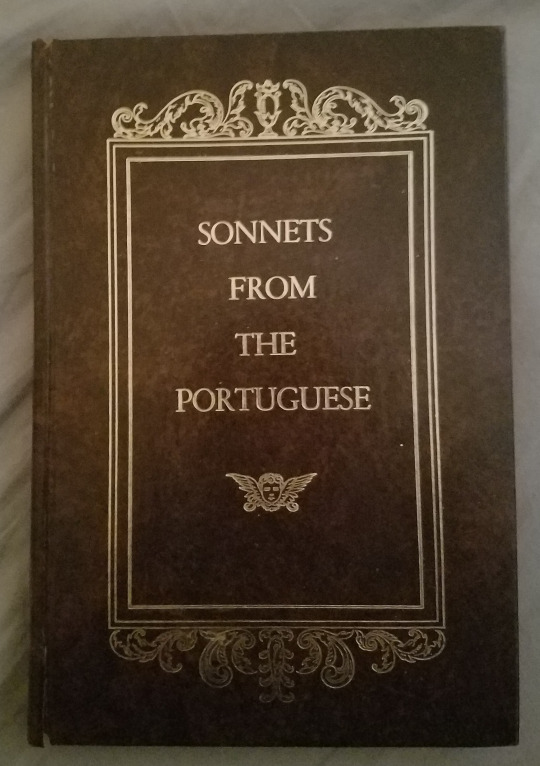
I flip through, and every sonnet is accompanied by a different piece of silhouette art. It’s lovely, and it sings to me. A small pencil mark on the inside indicates it only costs a couple bucks, so I rummage in my wallet, stop by the front desk, and leave the store with the book clutched in my hands. With the rest of my cash I go to the gelateria next door and pick a couple of unusual flavors and again, alone, I choose a rickety metal table outside and sit with nothing but birds and sunshine for company. I skip the introduction and open the book immediately to the first sonnet:
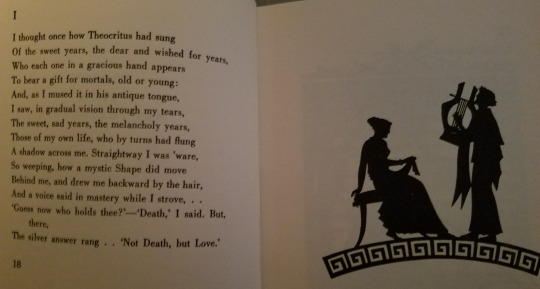
I thought once how Theocritus had sung Of the sweet years, the dear and wished for years, Who each one in a gracious hand appears To bear a gift for mortals, old or young: And, as I mused it in his antique tongue, I saw, in gradual vision through my tears, The sweet, sad years, the melancholy years, Those of my own life, who by turns had flung A shadow across me. Straightway I was ’ware, So weeping, how a mystic Shape did move Behind me, and drew me backward by the hair, And a voice said in mastery while I strove, . . 'Guess now who holds thee?'—'Death,' I said, But, there, The silver answer rang . . 'Not Death, but Love.'
What do you glean from the poem? It is slow and sad, a bright mythologized ideal set against a woman sunk deep in dark grief, a darkness that swiftly shifts into horror as a Shape appears behind her, physically pulls her from her weeping, and demands a response. She is so sure that her own death has at last come upon her, except what’s appeared…is love? Love, of all things? Love?
This is not at all what I am expecting to read. I fill up with another spoonful of gelato and eagerly turn the page.
And turn, and turn—Reader, I’m hooked. I’m strapped into a rollercoaster and freefalling down the first slope, on a wild ride built by a woman who’s been chronically ill since childhood, who’s lived through the death of her mother and beloved brother, whose father keeps her in his house and firmly under his thumb even long into her thirties, who still manages to write and get published and yet still lives lonely in her dark room…Sonnets from the Portuguese is an epic journey via the most astonishing set of 44 sonnets about how love completely changed her life, sonnets which her husband later touted to be the best in English since Shakespeare (and I agree). If you haven’t read the sonnets I encourage you to do so before reading on, link here, but if you’d rather I walk you through…
Even reading them again now I am in awe. How baldly and boldly she talks about how she and Robert, because of course it’s about her famous courtship with Robert Browning, are not meant to be. Not just her circumstances at home, not just her poor health, not just the fact that she thinks herself so below him and his worth, but also her grief. The darkness that lives in her! So many lines from these poems are woven into the tapestry of my life, like from sonnet V: Behold and see / What a great heap of grief lay hid in me. She warns that it could ruin him. Stand further off then! go! it ends.
And yet the next one (VI) begins: Go from me. Yet I feel that I shall stand / Henceforward in thy shadow. It is too late. She’s already been changed. The world and her perception of it are already shifting. Read how the beginning of VII illustrates this:
The face of all the world is changed, I think, Since first I heard the footsteps of thy soul Move still, oh, still, beside me, as they stole Betwixt me and the dreadful outer brink Of obvious death, where I, who thought to sink, Was caught up into love, and taught the whole Of life in a new rhythm. The cup of dole God gave for baptism, I am fain to drink, And praise its sweetness, Sweet, with thee anear.
She was sinking into oblivion, death her companion, until he stood between them and she was caught up into love, no longer to go through her days sitting simple and still in her room, content to wallow in the sorrow she’d been given. Yet…that still doesn’t matter, because how can she reciprocate? And, crucially, does it make her a bad person that she can’t?
am I cold, Ungrateful, that for these most manifold High gifts, I render nothing back at all? Not so; not cold,—but very poor instead. (VIII)
Have you ever been there? Found yourself wondering if you’re even capable of love and kindness toward others given all you’ve been through, and how horrible it feels to think that ability’s been stolen from you? Is what little you can eke out even worth anything in comparison? Beloved, I only love thee! let it pass. (IX)
But she continues turning the idea of love over in her mind. Could it be that love is fully worthy, no matter where it comes from? There’s nothing low / In love, she reasons, when love the lowest (X). Still it does not seem that she herself could be worthy—and if this is worthy love, anyway, would she have even known how to do it if she’d not first been shown by him?
And thus, I cannot speak Of love even, as a good thing of my own: Thy soul hath snatched up mine all faint and weak, And placed it by thee on a golden throne,— And that I love (O soul, we must be meek!) Is by thee only, whom I love alone. (XII)
It seems that Robert persists in his own love, because then an earnest plea: that he love her for love’s sake, because people change in time. She herself is changing now because of him! Do not even love her because he loves taking care of and comforting her, because his love could lessen her need for that comfort! (XIV)
Regardless she is not without feeling, as sad and calm as she outwardly seems. She’s just not like him. But…could his love and his will be strong enough to overcome all these obstacles? Why, conquering / May prove as lordly and complete a thing / In lifting upward, as in crushing low! With such success, she says, I at last record, / Here ends my strife. (XVI)
But of course, nothing can be quite so simple. Her first question is how she can be useful to him. This does not feel like a full partnership:
How, Dearest, wilt thou have me for most use? A hope, to sing by gladly? or a fine Sad memory, with thy songs to interfuse? A shade, in which to sing—of palm or pine? A grave, on which to rest from singing? Choose. (XVII)
That theme of death, too, is still ever-present. Even as the next couple of sonnets talk about how they’ve exchanged locks of hair she speaks of it. In XX a sea-change is further revealed, however, when she compares her life before Robert to the one after knowing him, how link by link, [I] Went counting all my chains but now, in contrast to VII’s cup of dole, she drinks from life’s great cup of wonder! She begs him to keep saying that he loves her (XXI), continuing the theme that his love will teach her, lift her, allay her many fears. But the next again ends with the death-hour rounding it.
Robert’s response? That her death would harm him. She admits to marveling at this revelation. If it is to be believed,
Then my soul, instead Of dreams of death, resumes life’s lower range. Then, love me, Love! look on me—breathe on me! As brighter ladies do not count it strange, For love, to give up acres and degree, I yield the grave for thy sake, and exchange My near sweet view of heaven, for earth with thee! (XXIII)
So first we learn that it is Love, not Death that has grabbed her; then we know that she feels Robert’s soul has slipped between her and the brink of death and thus she begins to question her constant sorrow; she is changing by his love; she will stop worrying about her worthiness and be of use to him and bask in what love he is willing to give her; but only now, finally, does she give up death itself in order to live her life. She is choosing to live!
The next few sonnets double down on this, about how all her hope had become despair, about how for so long she only had visions for company, and didn’t know they were mere shades in comparison to a reality of actually living, how Love, as strong as Death, retrieves as well. Also important? His saving kiss (XXVII).
We’ve come far, but progress isn’t an even trajectory. The rollercoaster dips again: now that she wishes to live, she wishes to live in his presence. She is both touch-starved and starved for company. Because their letters—one of, if not the most famous set of love letters in the English language—are to her all dead paper, mute and white! She speaks of how they fixed a day in spring / To come and touch my hand…a simple thing, / Yet I wept for it! (XXVIII) So we got the first mention in the last sonnet of his kissing her, and now a memory of when he first touched her hand. She goes on to write about how thinking of him is no longer enough; she needs to be near him. She then wonders, when he is gone, if she has embellished his feelings for her. Can you blame her? I certainly can’t. Her dark thoughts are now manifesting in these doubts about her perception, rather than her abilities.
But upon his next visit, she admits, I erred / In that last doubt! (XXXI). His presences reassures that all is real, not dream. And while she has always found it unlikely that their bond could have formed so fast (Quick-loving hearts, I thought, may quickly loathe, XXXII), now that she knows him she knows it was wrong to think that of him. She then brings up her childhood and draws parallels between the bright happy love she felt then with the love she feels now…even though, given the life she’s lived, the love she feels really can’t be the same. Her thoughts are no longer that of a child’s, which can be lightly turned aside, but for him she can and will turn from her dark, lonely thoughts when called.
This all decided, that their love is deep and true and as real as the loves she used to feel, and that she wants to be with him, an important question remains: If I leave all for thee, wilt thou exchange / And be all to me? Simply reading the poems and knowing their time period (Victorian) it could be enough to assume that it’s a regular leaving of your childhood home to create your own. But remember what I said at the beginning? The control her father exerts over her? She knows he would never approve. Hell, it was difficult enough for her siblings to make lives for themselves within his shadow. Going with Robert would mean truly leaving everything. She knows it won’t be easy: For grief indeed is love and grief beside (XXXV).
This great fear invites more doubt. She admits she has grown stronger and more confident, but that doesn’t make her troubles disappear. She knows she does their love a disservice in so doubting and in so fearing, but she can’t help it. But then…she returns to the physical, to his presence. In XXXVIII she speaks of their first three kisses: the first on her hand, the second for her forehead, but half-landed on her hair, and the third upon my lips was folded down / In perfect, purple state; since when, indeed / I have been proud and said, “My love, my own.”
She goes on in the next sonnets to say how grateful she is that he truly sees her and knows her beyond all the layers of sorrow and sickness she labors under. It should also be noted that, uncommonly for their time, he at 33 or so was courting her at 39/40. And so she is grateful, too, that he thinks it soon when others cry “Too late.” (XL). She then thanks all who had ever loved or listened, but again thanks Robert for listening to her even when it was difficult. She doubles down, now, on her decision to live:
I seek no copy now of life’s first half: Leave here the pages with long musing curled, And write me new my future’s epigraph, New angel mine, unhoped for in the world! (XLII)
And then—only now, as the rollercoaster shoots us upward and onward in joy and hope for a good, loving future—does she begin sonnet XLIII with How do I love thee? She asks this, not as some young girl with no life experience about a boy she’s seen across the room (I mean, how else was I supposed to interpret it, given how it’s used in the modern age?). She asks this as a woman full four decades into her life, a life full of chronic illness, an authoritarian home, and familial grief. She asks this after months of courtship during which she fought for every inch of belief, and hope, and joy. Where she at last came to know her own strength of heart and of will. Because she does leave her home, dear Reader. She elopes with Robert Browning, gets married in France, and lives out the rest of her life in Italy, where death finally catches up to her at 55. Keep all this in mind, as you read the sonnet in full:
How do I love thee? Let me count the ways. I love thee to the depth and breadth and height My soul can reach, when feeling out of sight For the ends of Being and ideal Grace. I love thee to the level of everyday’s Most quiet need, by sun and candlelight. I love thee freely, as men strive for Right; I love thee purely, as they turn from Praise. I love thee with the passion put to use In my old griefs, and with my childhood’s faith. I love thee with a love I seemed to lose With my lost saints,—I love thee with the breath, Smiles, tears, of all my life!—and, if God choose, I shall but love thee better after death.
There is one more sonnet, where she brings back flowers, a motif I didn’t spend time on in this post, to talk about how their souls are intertwined down to their roots. I bring it up now not just because flowers end this glorious cycle of forty-four poems, but because I think of her grave.
A year or two after I fell in love with these poems I was lucky enough to be in Italy myself. Some friends and I were walking around Florence and I insisted we had to find the English cemetery. I remember it as being this island of a hill in the middle of some busy streets, all fenced in with a little building at the entrance. When we scurried across the street and inside, there was a nun there who greeted us warmly. I told her I was looking for Elizabeth Barrett Browning and she lit up. She motioned for us to follow as she told me that they do their best to take care of her grave, and have always done so (I don’t know if she means just those who work there or Italians in general, as EBB was loved by Florence in her time). But, she said, they did not look kindly upon Robert, because he spent all this money on a beautiful tomb but he never, ever came to visit. She said this with the authority of someone who had witnessed it herself, though of course that was impossible. This was clearly a story deemed important enough—or perhaps simply so full of strong feeling—to stand the test of time.
The tomb is indeed beautiful. The pictures when I did a quick lookup on the internet do not do it justice; forgive me for not having the energy now to dig up where I’ve saved the old files of the pictures I took myself. At the time it was absolutely surrounded by tall, enormous roses, deep red in color. After I had my fill the nun was kind enough to take us on a tour of the rest of the cemetery, which was lovely. But I’ve never been able to shake the memory of that story, the one where the nuns lived and died resentful of an absent Robert.
It wasn’t until about a year and a half ago, when I read Fiona Sampson’s recent biography Two-Way Mirror: The Life of Elizabeth Barrett Browning that it finally made sense. Robert often avoided grief in this way, it seems, afraid to travel back to England when family members were ailing until it was too late. Whether you agree with his actions or not, his absence we can at least hope is from his great love turned to great grief, rather than a lack of feeling on his part. He himself died in Venice; their only child died in Italy also. Robert is, however, still separated from Elizabeth in death: he is buried in Poet’s Corner, Westminster Abbey, London.
If you’re hoping for a neat bow on the end of this post, there isn’t. I think of her often not just because I love her poetry but, I suppose, because each year is slowly, inexorably bringing me closer to the age she was when she decided she would live her life again, and though I haven’t found a soul-shaking love like she has, I am trying, trying, trying to live, too.
29 notes
·
View notes
Text
Meet a New Generation of Black American ‘Cowboys’
With these images, photographer Kennedi Carter smashes an age-old stereotype: Cowboys aren’t all white men on horses, battling Indigenous people.
— Story and Photographs By Kennedi Carter | July 18, 2023

Doniyel Hooker bought her horse, Chance, in 2018. Whenever possible, Hooker, a math and science teacher, brings Chance to her elementary school to provide new experiences for her students. She’s ridden Chance on trails and even through the French Quarter of New Orleans.
The first time I saw a Black horseman, I was maybe six years old. I’m 24 now, grew up in the suburbs of Durham, North Carolina, but my mother’s family is from Dallas, and we’d drive back to visit. I remember this as one of those things where you’re chilling in the back seat, you see something crazy, your head does a complete 180. Cowboys! The white-man-on-a-horse archetype; battles with Indigenous people: That’s what I was most familiar with, from going to the movies with my grandfathers. So about five years ago, as I began to photograph on film, I thought it would be very interesting to turn that cowboy narrative inside out a bit. It’s always important to expand the narrow confines of what we perceive to be American culture, and how we as Black people sit inside it.
I’ve had a whirlpool of feelings, being a witness to these people. There’s a rich history of Black American cowboys, but for my work I’ve used the word “equestrian”—more inclusive now, I think. For a long time I observed from the ground, asking equestrians whether I could photograph them; I’d never ridden a horse myself until I climbed onto one while visiting trainer Silas Plummer outside New Orleans. Did I feel fully comfortable or at home? No. I thought a lot about not falling off. But in the Louisiana town where my grandfather was born, his sharecropper family didn’t have cars, so one assumes they were using horses or mules to get around. That was beautiful to circle back to, very ancestral.
And my biggest takeaway, working with all the equestrians, is just how alive they feel when they’re on a horse. There’s a freedom that comes from interacting with animals, with nature, with the land. This is what one form of that freedom looks like.
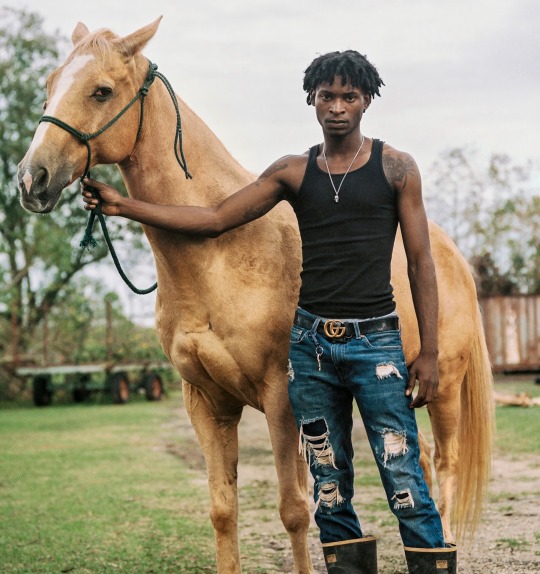
Horse trainer Silas Plummer holds Kash outside Child’s Arena stables in Bridge City, Louisiana. From wranglers to rodeo riders to jockeys, Black men and women have made their mark in many areas of horsemanship. In the United States, for example, an estimated one in four cowboys in the late 19th century was Black.
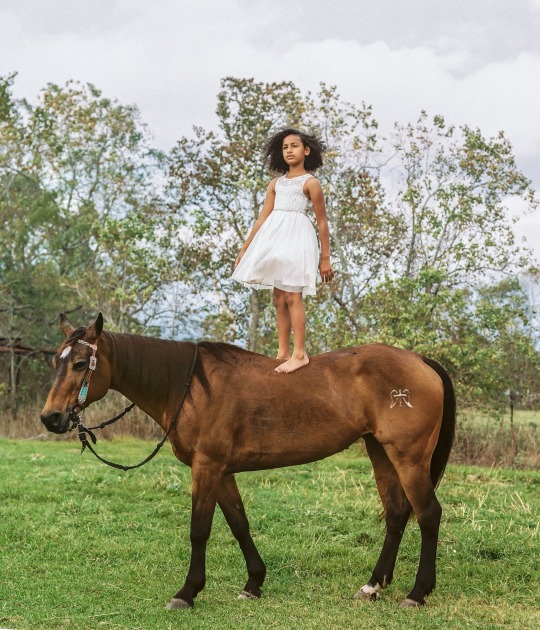
MaLana Lewis first rode a horse at age five during a camping trip. Her family later got her into barrel racing classes, and she has collected 24 first-place ribbons with her horse, Star. This photograph was taken in 2020, when Lewis was nine.

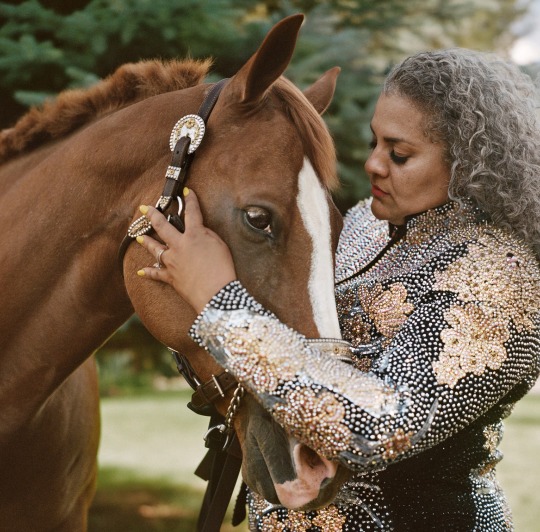
Left: Born to formerly enslaved parents in Texas, Bill Pickett became the best known Black rodeo star at the turn of the 20th century. He created the sport of bulldogging, or steer wrestling. Pickett performed around the world and was the first Black man inducted into the National Rodeo Hall of Fame. Courtesy North Fort Worth Historical Society
Right: After barrel racing as a teen, Esperanza Tervalon now trains with JaxieBaby in Bend, Oregon, to “go low and slow” in western pleasure riding competitions. The political consultant turns to horses to bring peace to her life. “I get centered. I always leave the barn feeling better than when I walked in.” Photograph By Kennedi Carter
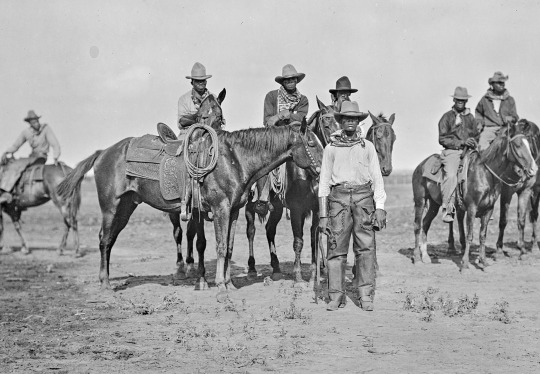
In the early 1900s, Black communities held festivals and rodeos in cattle country across various southern states. Here a group of cowhands show off their steeds at the Negro State Fair on the Fannin County Fairgrounds north of Bonham, Texas, in 1911. The annual event involved four days of parades, music, and rodeos. Racers also competed for prizes of $2 to $50. Courtesy of Erwin E. Smith Collection of The Library of Congress On Deposit at Amon Carter Museum of American Art, Fort Worth, Texas
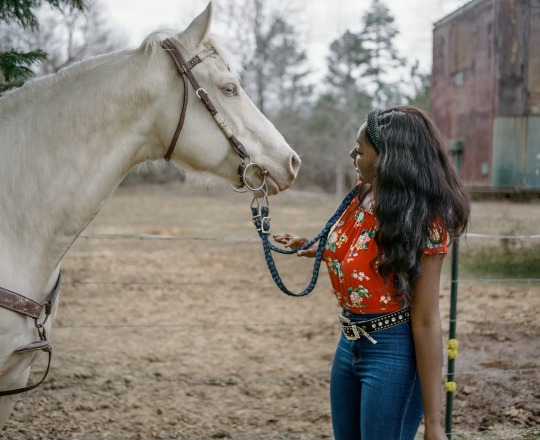
Trigger was Vinsha Torain’s first horse, and the two have ridden together since the college student was 13. Torain helps run the family ranch, started by her grandfather, in Siler City, North Carolina, and also heads Torain Ranch’s riding club, composed mainly of Black women.


Left: Nat Love, also known as Deadwood Dick, was born into slavery on a Tennessee plantation in 1854. After the Civil War he moved west and spent 20 years driving cattle. He got his nickname in Deadwood, South Dakota, after beating out every other competitor in roping and shooting contests.
Right: Isom Dart, born into slavery as Ned Huddleston in 1849 in Arkansas, was killed in 1900 in Colorado by a bounty hunter. A jack of many trades, including cook, miner, stunt rider, and horse and cattle thief, he was, ironically, shot for suspected cattle rustling once he’d gone straight. Courtesy Denver Public Library, Western History Collection
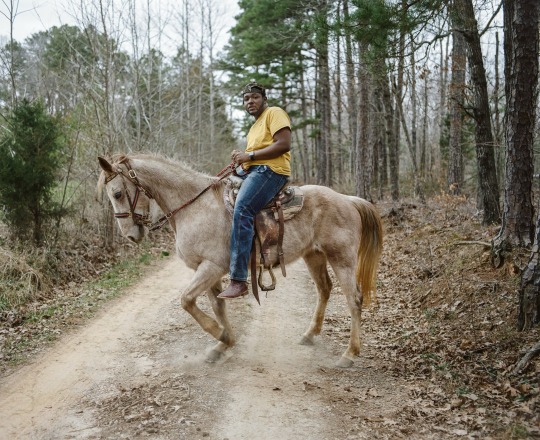
Jamel Robinson puts a client’s horse through exercises on a trail in Siler City. He started riding when he was four and training horses when he was 17. Robinson plans to stay in the business, which he learned from his father. “Horses keep me in a good mind space,” he says.
19 notes
·
View notes
Text
Read in 2024

Michael Oakeshott, On Human Conduct
Edmund Neill, Michael Oakeshott
I read On Human Conduct a few years ago – exactly when, I’m not sure, as it doesn’t seem to turn up on any of my books-read list – but it made an impression, partly for being difficult, and partly for (as I recalled it) being an argument against using social concepts to explain things.
Rereading it, along with two books about Oakeshott – the one above by Edmund Neill and one late last year by Paul Franco – I would stick with both my conclusions, but adjust them a little, and add another one.
The argument against using social concepts wasn’t quite so clearcut on this second reading, but I think it’s still true. Essentially, Oakeshott says people don’t do things because of abstract things like “social forces”, but because of their interactions with other people. His target here seems to be the whole of sociology and much of the rest of the social sciences. The suggestion, for example, that people are shaped by culture, I would imagine he would have seen as derisory: your culture plays out in your encounters with others, either directly or (presumably) mediated through things such as books which you read, etc. He doesn’t say as much, but I think there’s the idea here that you are the author of your actions (which is not to say that your circumstances aren’t important – they clearly are – but you’re the one making sense of them with whatever mental tools you have available to you).
And he is a difficult writer. He writes negatively a lot (“things are not A, and nor are they B, nor C either …”), and certainly on a first reading he doesn’t give the reader much in the way of signposts to follow. Also he tends not to make arguments – having dealt with what things aren’t, he then asserts what they are – and he uses/invents a lot of latinate phrases, most of which are quite clear but with meanings modified to meet his needs. But reading him a second time with a goal (mainly to see if my view of his views on social forces was actually right nor not) was a lot easier than just reading him the first time round to see what he was about.
As to the third, what I found by far most interesting on my second reading was the book’s third and last part, “On the Character of a Modern European State”, and its suggestion that European states existed in tension between being civic associations – bodies based on laws that applied to all but which have no goals in themselves – and enterprise associations – bodies established to realise a goal. The traditional liberal state is a civic association, existing to let its citizens do whatever they want provided they don’t break the laws which govern them all; a socialist state would be an enterprise association in which individual freedoms come far behind the overall goal of advancing productive forces and welfare, with education aimed at socializing people to those goals. There is of course a lot more subtlety in Oakeshott’s argument than this, though perhaps less than you might imagine – though he obviously leans towards the civic association side, he also would have accepted that states also have goals they should strive to meet.
I think this is very much an argument worth making. For Oakeshott, it stems from Europe’s ways of ruling dating back to the middle ages, and how as states emerged they posed the problem of exactly what these entities which changed the way people were governed actually were.
Being a conservative, he saw tradition – habits passed on from person to person – as important and wasn’t interested in notions such as market forces or rights. Yet he was also an advocate of modernity – that in the 20th century versions of states, especially the more liberal ones, people could lead meaningful lives of their own making.
Neill and Franco’s books on Oakeshott I found useful – not so much for the politics side of his thinking, which I think you can unravel yourself without too much trouble, but for the other parts of his life and thinking, which I don’t think I would want to spend much time on.
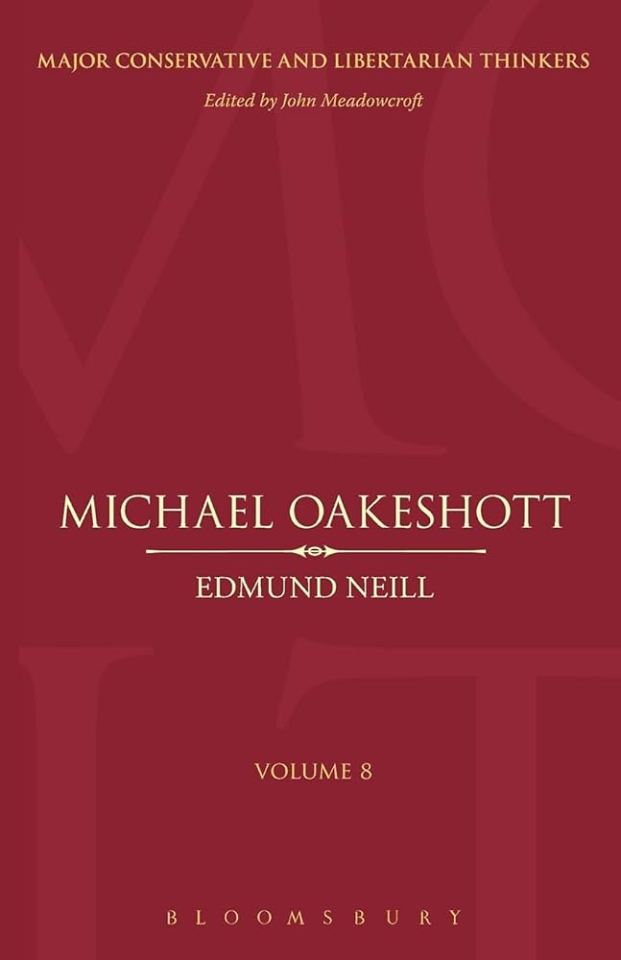
2 notes
·
View notes
Text
hey new followers
i think you guys are here bc of the Ousmane Sembene post? which is neat bc i’m always happy to talk about him! but yeah, if anyone is interested, I’m down to talk more about my favorite African writers or how I find/research african literature as a (white and monolingual) American.
Growing up in the US we’re really really discouraged from pursuing or enjoying literary traditions or even films outside the western canon, and it’s definitely a learning and unlearning process to break through white-normative Anglophone literary rules and actually learn how to appreciate art from other literary traditions. Even the novels from international writers sold in my town are...filtered to only include US sympathetic books and books originally written in english. So a lot of the books I recommend I’ve had to find online, borrow from friends, or hunt down second-hand. I’m definitely still in the beginning stages of working through the propaganda i grew up on so i really appreciate any corrections/advice that folks have, especially if i misrepresent or misinterpret one of your favorite books.
that all being said, here’s a couple more african writers whose works i’ve read this month that I recommend: (my keyboard doesn’t let me type accent marks so I have to use the Anglicized versions of several of their names)
-Yvonne Adiambo Owuor: She’s a late 20th century/contemporary writer who’s written a bunch of short stories, plays, novels, and linguistic essays. That being said, tracking her work down in English is a pain in the ass, and the English short stories that are out there have an annoying tendency to only be published in anthologies that can be hard to hunt down. That being said, I definitely think that finding her writing is worth the effort-she has one of my favorite writing styles I’ve come across, it’s really dense and descriptive but also very very visceral when she wants it to be? Expect to have a dictionary or google on hand going in-I found the reading to be a really slow but rewarding process. The two works I’ve been able to read by her are the Weight of Whispers (a “short” story) and Dust (a full length novel). Owuor writes a lot about the tensions between Kenyan, Rwandan, and Ethiopian people caused by migration and the political strife and genocides of the 1990s. Weight of Whispers is a really hard, really heartbreaking story about one wealthy Rwandan family’s struggles in the aftermath of fleeing the genocide, and the way in which their marginalization as refugees slowly robs them of sympathy from their friends and neighbors, and the way that otherwise wealthy and intelligent Africans were forced to debase themselves and conform to european colonizer’s expectations in order to survive. Dust is technically a story of one family’s grieving process after they find the body of their son, who was killed by police in the streets, but it’s also a novel about borders, colonization, the uneven construction and censorship of historical narratives, forgiveness of historical wrongs, and also grief. It’s really really good
-Binyavanga Wainaina: another Kenyan author, if you’re familiar with this guy from his satirical How to write about Africa essay, then you know that he’s fucking funny. A lot of his work is mostly short stories, semi-autobiographical writing and political essays written to his fellow Kenyans. I’m gonna be honest: I don’t understand Gikuyu politics enough to appreciate his political essays (I think the closest english term I have to describe the issues he writes about is “tribalism” but that’s not quite right) but I did like his short story An Affair to Dismember, which I found for free here
-Sony Lab’ou Tansi: This guy is one of the GREATS of 20th century African writing, but since he was Congolese (he lived in both Kinshasa and Brazzaville) most of his writing is only available in French, and English translations can be really hard to come by. I’ve been able to find a couple of his books translated, but I heavily suspect the translations themselves aren’t great: there’s a real difference in quality between the structure of the plot/the pacing of certain scenes (a lot of foreshadowing, dramatic irony, and repetitions on a theme), and the actual sentence-to-sentence writing style, which I found hard to stay engaged with. Like a lot of African writing, I’ve found that Tansi has a tendency to introduce a lot of plot points, minor characters, and political analogies, but he doesn’t hold the readers hand or focus on any one thing in particular, so you have to either take notes or be okay with not really “getting” everything he has to say. I just finished the Antipeople, and I don’t want to give away the plot but just know going in to expect a lot of violence, impossible choices, deceit, and upheaval.
-Honorary mention: Jose Eduardo Agualusa is an Angolan writer of Portugeuse/Brazilian descent, so he doesn’t really draw from any inherently Angolan storytelling devices or art movements, but I thought his novel A general theory of oblivian was so so good that it had to be included. At face value, it’s about a old Portuguese settler colonialist living in Luanda who quite literally walls herself into her apartment for three decades to avoid dealing with the Angolan war. This novel is translated into English and is pretty easy to find, and the translation is exceptionally done-it is a very short book and not a word is wasted. Expect some fun experiments with a mixed epistolary and prose format, some very honest descriptions of European bigotry/white supremacy, and a lot of very real, very human side characters.
that’s all for now, let me know if you have any recommendations?
0 notes
Text
Anonymous asked: I have always appreciated your thoughtful views on the defence of the British monarchy, and as a university historian it’s reassuring to see someone using history to make invalubale insights to a controversial institution. I wonder what are your own thoughts on the passing of Prince Philip and what his legacy might be? Was he a gaffe prone racist and a liability to the Queen?
I know you kindly got in touch and identified yourself when you felt I was ignoring your question. I’m glad we cleared that up via DM. The truth is as I said and I’m saying here is that I had to let some time pass before I felt I could reasonably answer this question. Simply because - as you know as someone who teaches history at university - distance is good to make a sober appraisal rather than knee jerk in the moment judgements.
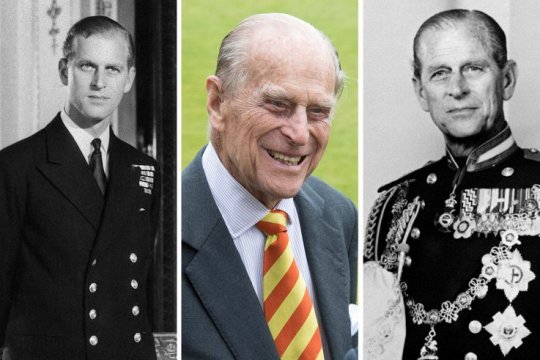
Contrary to what some might think I’m not really a fan girl when it comes to the royal family. I don’t religiously follow their every movement or utterance especially as I live in Paris and therefore I don’t really care about tabloid tittle tattle. I only get to hear of anything to do with the royal family when I speak to my parents or my great aunts and uncles for whom the subject is closer to their heart because of the services my family has rendered over past generations to the monarchy and the older (and dying) tight knit social circles they travel in.
Like Walter Bagehot, I’m more interested in the monarchy as an institution and its constitutional place within the historical, social, and political fabric of Britain and its continued delicate stabilising importance to that effect. It was Walter Bagehot, the great constitutional scholar and editor the Economist magazine, who said, “The mystic reverence, the religious allegiance, which are essential to a true monarchy, are imaginative sentiments that no legislature can manufacture in any people.” In his view, a politically-inactive monarchy served the best interests of the United Kingdom; by abstaining from direct rule, the monarch levitated above the political fray with dignity, and remained a respected personage to whom all subjects could look to as a guiding light.
Even as a staunch monarchist I freely confess that there has always been this odd nature of the relationship between hereditary monarchy and a society increasingly ambivalent about the institution. To paraphrase Bagehot again, there has been too much ‘daylight’ shone onto the ‘magic’ of the monarchy because we are obsessed with personalities as celebrities.
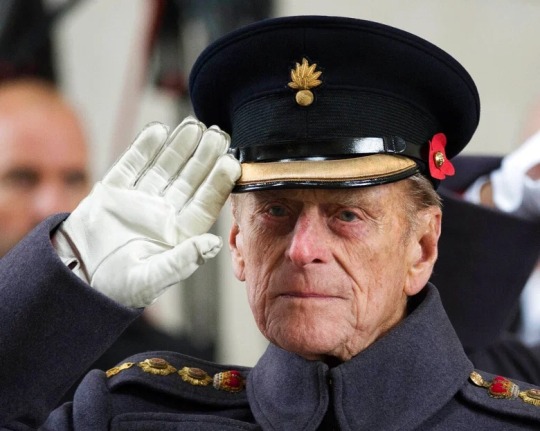
Having said that I did feel saddened by the passing of Prince Philip, the Duke of Edinburgh. After the Queen, he was my favourite royal. Anne, Princess Royal, would come next because she is very much like her father in temperament, humour, and character, so unlike her other brothers.
I have met the late Prince Philip when I was serving in the army in a few regimental meet-and-greet situations - which as you may know is pretty normal given that members of the royal family serve as honorary colonel-in-chiefs (patrons in effect) of all the British army regiments and corps.I also saw him at one or two social events such the annual charitable Royal Caledonian Ball (he’s an expert scottish reeler) and the Guards Polo Club where my older brothers played.
I’ll will freely confess that he was the one royal I could come close to identify with because his personal biography resonated with me a great deal.
Let’s be honest, the core Windsor family members, born to privilege, are conditioned and raised to be dull. Perhaps that’s a a tad harsh. I would prefer the term ‘anonymously self-effacing’, just another way of saying ‘for God’s sake don’t draw attention to yourself by saying or doing anything even mildly scandalous or political lest it invites public opprobrium and scrutiny’. The Queen magnificently succeeds in this but the others from Charles down just haven’t (with the exception of Princess Anne).
However, many people forget this obvious fact that it’s the incoming husbands and wives who marry into the Windsor family who are relied upon to bring colour and even liven things up a little. And long before Kate Middleton, Meghan Markle (very briefly), or Lady Diana Spencer, were the stars of ‘The Firm’- a phrase first coined by King George VI, Queen Elizabeth II's father who ruled from 1936 to 1952, who was thought to have wryly said, "British royals are 'not a family, we're a firm,” - it was Prince Philip who really livened things up and made the greater impact on the monarchy than any of them in the long term.
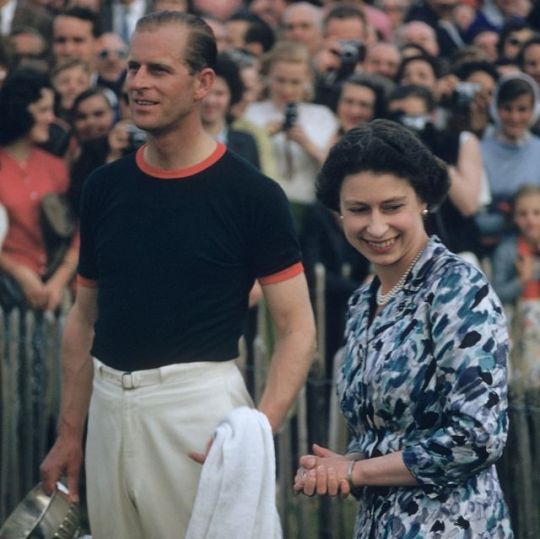
Prince Philip’s passing belied the truth of a far more complex individual: a destitute and penniless refugee Greek-Danish prince with a heart breaking backstory that could have been penned by any 19th Century novelist, and also eagle eyed reformer who tried to drag the royal family into the 20th century. At the core of the man - lost scion of a lost European royal dynasty, a courageous war veteran, and Queen’s consort - were values in which he attempted to transform and yet maintain much older inherited traditions and attitudes. Due to his great longevity, Philip’s life came to span a period of social change that is almost unprecedented, and almost no one in history viewed such a transformation from the front row.
Prince Philip would seem to represent in an acute form the best of the values of that era, which in many ways jar with today’s. He had fought with great courage in the war as a dashing young naval officer; he was regularly rude to foreigners, which was obviously a bonus to all Brits. He liked to ride and sail and shoot things. He was unsentimental almost to a comic degree, which felt reassuring at a time when a new-found emotional incontinence made many feel uncomfortable. Outrageous to some but endearing to others, he was the sort of man you’d want to go for a pint with, perhaps the ultimate compliment that an Englishman can pay to another Englishman. This has its own delicious irony as he wasn’t really an Englishman.
There are 4 takeways I would suggest in my appraisal of Prince Philip that stand out for me. So let me go through each one.
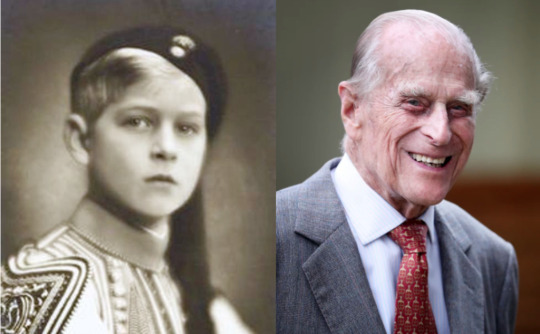
1. Prince Philip’s Internationalism
It may seem odd for me to say that Prince Philip wasn’t English but he wasn’t an Englishman in any real sense. He was a wretch of the world - stateless, homeless, and penniless. That the Prince of Nowhere became the British Monarchy’s figurehead was more than fitting for a great age of migration and transition in which the Royal Family survived and even flourished. That he was able to transform himself into the quintessential Englishman is testimony not just to his personal determination but also to the powerful cultural pull of Britishness.
He was born on a kitchen table in Corfu in June 1921. A year later in 1922, Philip, as the the great-great-grandson of Queen Victoria and nephew of Constantine I of Greece, was forced to flee with his family after the abdication of Constantine. He grew up outside Paris speaking French; ethnically he was mostly German although he considered himself Danish, his family originating from the Schleswig border region. He was in effect, despite his demeanour of Royal Navy officer briskness, a citizen of nowhere in an age of movement. From a very young age he was a stateless person, nationally homeless. Indeed, Philip was an outsider in a way that even Meghan Markle could never be; at his wedding in 1947, his three surviving sisters and two brothers-in-law were not permitted to attend because they were literally Britain’s enemies, having fought for the Germans. A third brother-in-law had even been in the SS, working directly for Himmler, but had been killed in the conflict.
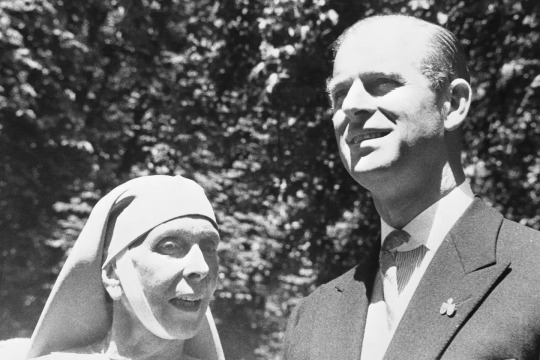
Even his religion was slightly exotic. He was Greek Orthodox until he converted to Anglicanism on marrying Elizabeth - what with his wife due to become supreme head of the Church and everything - but his ties with eastern Christianity remained. His great-aunts Princess Elisabeth of Hesse and by Rhine and Tsarina Alexandra are both martyrs of the Russian Orthodox Church, having been murdered by the Bolsheviks; Philip’s mother went on to become an Orthodox nun and a “Righteous Among the Nations” for saving a Jewish family during the Nazi occupation of Greece, spending much of her time in squalid poverty.
His parents were part of the largely German extended aristocracy who ruled almost all of Europe before it all came crashing down in 1918. When he died, aged 99, it marked a near-century in which all the great ideological struggles had been and gone; he had been born before the Soviet Union but outlived the Cold War, the War on Terror and - almost - Covid-19.
The world that Philip was born into was a far more violent and dangerous place than ours. In the year he was born, Irish rebels were still fighting Black and Tans; over the course of 12 months the Spanish and Japanese prime ministers were assassinated, there was a coup in Portugal and race riots in the United States. Germany was rocked by violence from the far-Left and far-Right, while in Italy a brutal new political movement, the Fascists, secured 30 seats in parliament, led by a trashy journalist called Benito Mussolini.
The worst violence, however, took place in Greece and Turkey. Following the defeat of the Ottoman Empire, what remained of Turkey was marked for permanent enfeeblement by the Allies. But much to everyone’s surprise the country’s force were roused by the brilliant officer Mustafa Kemal, who led the Turks to victory. Constantinople was lost to Christendom for good and thousands of years of Hellenic culture was put to the flames in Smyrna.
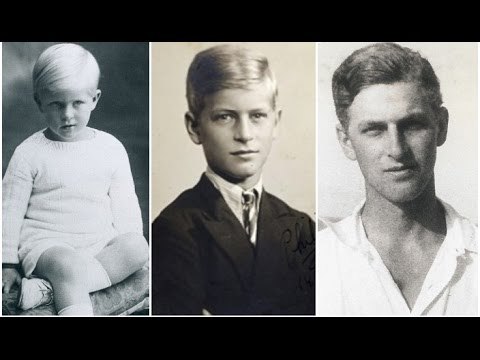
The Greek royal family, north German imports shipped in during the 19th century, bore much of the popular anger for this disaster. King Constantine fled to Italy, and his brother Andrew was arrested and only escaped execution through the intervention of his relative Britain’s George V. Andrew’s wife Alice, their four daughters and infant son Philip fled to France, completely impoverished but with the one possession that ensures that aristocrats are never truly poor: connections.
Philip had a traumatic childhood. He was forged by the turmoil of his first decade and then moulded by his schooling. His early years were spent wandering, as his place of birth ejected him, his family disintegrated and he moved from country to country, none of them ever his own. When he was just a year old, he and his family were scooped up by a British destroyer from his home on the Greek island of Corfu after his father had been condemned to death. They were deposited in Italy. One of Philip's first international journeys was spent crawling around on the floor of the train from an Italian port city, "the grubby child on the desolate train pulling out of the Brindisi night," as his older sister Sophia later described it.
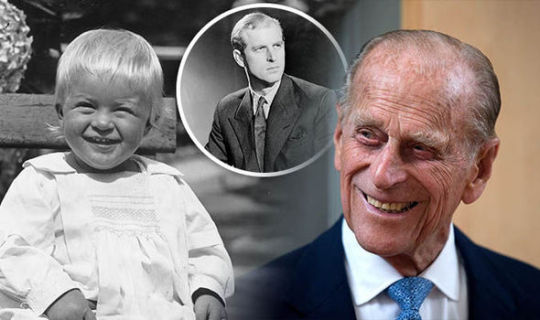
In Paris, he lived in a house borrowed from a relative; but it was not destined to become a home. In just one year, while he was at boarding school in Britain, the mental health of his mother, Princess Alice, deteriorated and she went into an asylum; his father, Prince Andrew, went off to Monte Carlo to live with his mistress. "I don't think anybody thinks I had a father," he once said. Andrew would die during the war. Philip went to Monte Carlo to pick up his father's possessions after the Germans had been driven from France; there was almost nothing left, just a couple of clothes brushes and some cuff-links.
Philip’s four sisters were all much older, and were soon all married to German aristocrats (the youngest would soon die in an aeroplane crash, along with her husband and children). His sisters became ever more embroiled in the German regime. In Scotland going to Gordonstoun boarding school, Philip went the opposite direction, becoming ever more British. Following the death of his sister Cecilie in a plane crash in 1937, the gulf widened. As the clouds of conflict gathered, the family simply disintegrated. With a flash of the flinty stoicism that many would later interpret, with no little justification, as self-reliance to the point of dispassion, the prince explained: “It’s simply what happened. The family broke up… I just had to get on with it. You do. One does.”
In the space of 10 years he had gone from a prince of Greece to a wandering, homeless, and virtually penniless boy with no-one to care for him. He got through it by making a joke of everything, and by being practical.
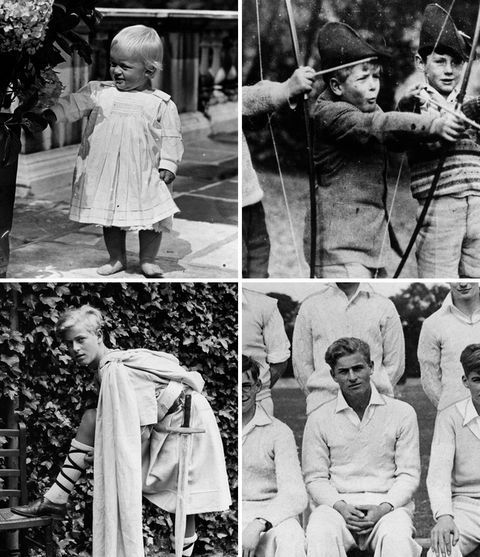
By the time he went to Gordonstoun, a private boarding school on the north coast of Scotland, Philip was tough, independent and able to fend for himself; he'd had to be. Gordonstoun would channel those traits into the school's distinct philosophy of community service, teamwork, responsibility and respect for the individual. And it sparked one of the great passions of Philip's life - his love of the sea. It was Gordonstoun that nurtured that love through the maturation of his character.
Philip adored the school as much as his son Charles would despise it. Not just because the stress it put on physical as well as mental excellence - he was a great sportsman. But because of its ethos, laid down by its founder Kurt Hahn, a Jewish exile from Nazi Germany.
Hahn first met Philip as a boy in Nazi Germany. Through a connection via one of his sister’s husbands, Philip, the poor, lonely boy was first sent off to a new school - in Nazi Germany. Which was as fun as can be imagined. Schloss Salem had been co-founded by stern educator called Kurt Hahn, a tough, discipline-obsessed conservative nationalist who saw civilisation in inexorable decline. But by this stage Hahn, persecuted for being Jewish in Nazi Germany, had fled to Britain, and Philip did not spend long at the school either, where pressure from the authorities was already making things difficult for the teachers. Philip laughed at the Nazis at first, because their salute was the same gesture the boys at his previous school had to make when they wanted to go to the toilet, but within a year he was back in England, a refugee once again.
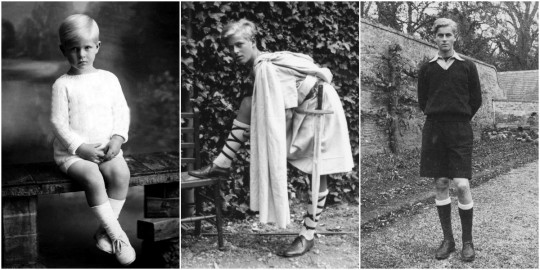
Philip happily attended Hahn’s new school, Gordonstoun, which the strict disciplinarian had set up in the Scottish Highlands. Inspired by Ancient Sparta, the boys (and then later girls) had to run around barefoot and endure cold showers, even in winter, the whole aim of which was to drive away the inevitable civilisational decay Hahn saw all around him. To 21st century ears it sounds like hell on earth, yet Philip enjoyed it, illustrating just what a totally alien world he came from.
That ethos became a significant, perhaps the significant, part of the way that Philip believed life should be lived. It shines through the speeches he gave later in his life. "The essence of freedom," he would say in Ghana in 1958, "is discipline and self-control." The comforts of the post-war era, he told the British Schools Exploring Society a year earlier, may be important "but it is much more important that the human spirit should not be stifled by easy living". And two years before that, he spoke to the boys of Ipswich School of the moral as well as material imperatives of life, with the "importance of the individual" as the "guiding principle of our society".
It was at Gordonstoun one of the great contradictions of Philip's fascinating life was born. The importance of the individual was what in Kurt Hahn's eyes differentiated Britain and liberal democracies from the kind of totalitarian dictatorship that he had fled. Philip put that centrality of the individual, and individual agency - the ability we have as humans to make our own moral and ethical decisions - at the heart of his philosophy.
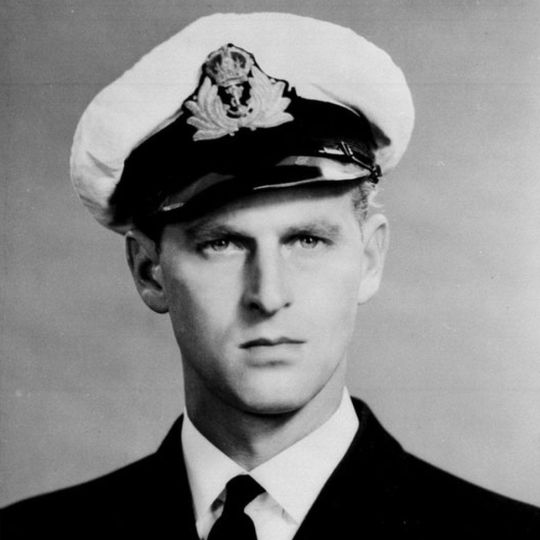
At Dartmouth Naval College in 1939, the two great passions of his life would collide. He had learned to sail at Gordonstoun; he would learn to lead at Dartmouth. And his driving desire to achieve, and to win, would shine through. Despite entering the college far later than most other cadets, he would graduate top of his class in 1940. In further training at Portsmouth, he gained the top grade in four out of five sections of the exam. He became one of the youngest first lieutenants in the Royal Navy.
The navy ran deep in his family. His maternal grandfather had been the First Sea Lord, the commander of the Royal Navy; his uncle, "Dickie" Mountbatten, had command of a destroyer while Philip was in training. In war, he showed not only bravery but guile. It was his natural milieu. "Prince Philip", wrote Gordonstoun headmaster Kurt Hahn admiringly, "will make his mark in any profession where he will have to prove himself in a trial of strength".
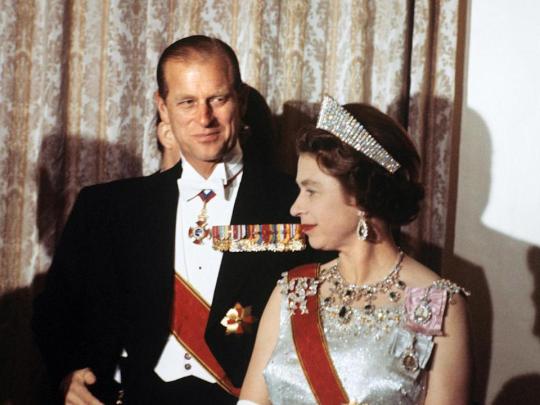
2. Prince Philip and the modernisation of the monarchy
In his own words, the process of defining what it meant to be a royal consort was one of “trial and error.” Speaking with BBC One’s Fiona Bruce in 2011, Philip explained, “There was no precedent. If I asked somebody, 'What do you expect me to do?' they all looked blank. They had no bloody idea, nobody had much idea.” So he forged for himself a role as a moderniser of the monarchy.
He could not have had much idea back in 1939. Back then in Dartmouth in 1939, as war became ever more certain, the navy was his destiny. He had fallen in love with the sea itself. "It is an extraordinary master or mistress," he would say later, "it has such extraordinary moods." But a rival to the sea would come.
When King George VI toured Dartmouth Naval College, accompanied by Philip's uncle, he brought with him his daughter, Princess Elizabeth. Philip was asked to look after her. He showed off to her, vaulting the nets of the tennis court in the grounds of the college. He was confident, outgoing, strikingly handsome, of royal blood if without a throne. She was beautiful, a little sheltered, a little serious, and very smitten by Philip.
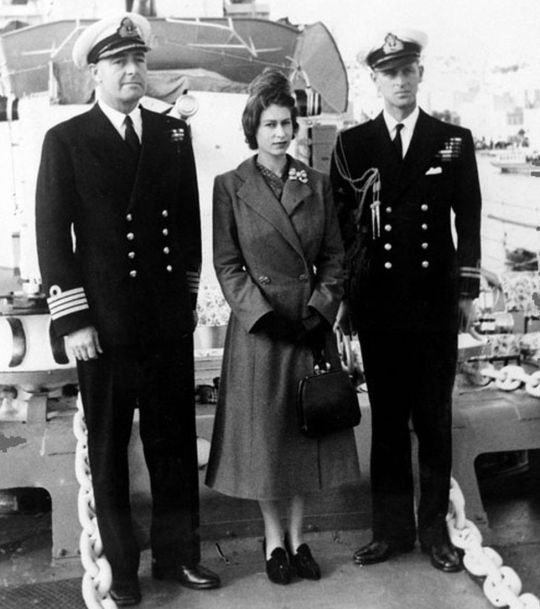
Did he know then that this was a collision of two great passions? That he could not have the sea and the beautiful young woman? For a time after their wedding in 1948, he did have both. As young newlyweds in Malta, he had what he so prized - command of a ship - and they had two idyllic years together. But the illness and then early death of King George VI brought it all to an end.
He knew what it meant, the moment he was told. Up in a lodge in Kenya, touring Africa, with Princess Elizabeth in place of the King, Philip was told first of the monarch's death in February 1952. He looked, said his equerry Mike Parker, "as if a ton of bricks had fallen on him". For some time he sat, slumped in a chair, a newspaper covering his head and chest. His princess had become the Queen. His world had changed irrevocably.
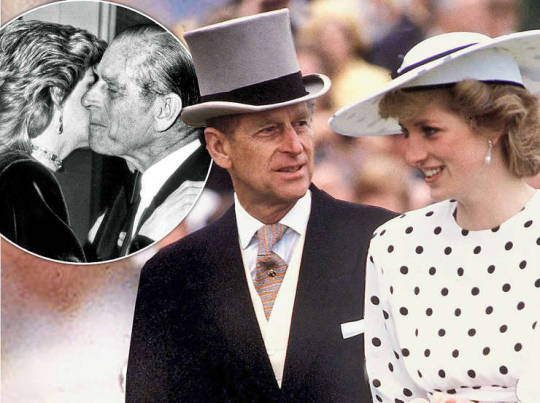
While the late Princess Diana was later to famously claim that there were “three people” in her marriage - herself, Prince Charles and Camilla - there were at least 55 million in Philip and Elizabeth’s. As Elizabeth dedicated her life to her people at Westminster Abbey at the Coronation on June 2, 1953, it sparked something of an existential crisis in Philip. Many people even after his death have never really understood this pivotal moment in Philip’s life. All his dreams of being a naval officer and a life at sea as well as being the primary provider and partner in his marriage were now sacrificed on the altar of duty and love.
With his career was now over, and he was now destined to become the spare part. Philip, very reasonably, asked that his future children and indeed his family be known by his name, Mountbatten. In effect he was asking to change the royal family’s name from the House of Windsor to the House of Mountbatten. But when Prime Minister Winston Churchill got wind of it as well as the more politically agile courtiers behind the Queen, a prolonged battle of wits ensued, and it was one Philip ultimately lost. It was only in 1957 that he accepted the title of “Prince.”
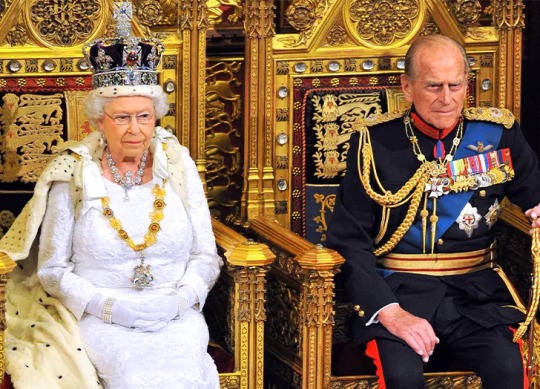
Even though he had almost lost everything dear to him and his role now undefined, he didn’t throw himself a pity party. He just got on with it. Philip tried to forge his own distinct role as second fiddle to the woman who had come to represent Great Britain. He designated himself the First Officer of the Good Ship Windsor. He set about dusting off some of the cobwebs off the throne and letting some daylight unto the workings of the monarchy by advocating reasonable amount of modernisation of the monarchy.
He had ideas about modernising the royal family that might be called “improving optics” today. But in his heart of hearts he didn’t want the monarchy to become a stuffy museum piece. He envisaged a less stuffy and more popular monarchy, relevant to the lives of ordinary people. Progress was always going to be incremental as he had sturdy opposition from the old guard who wanted to keep everything as it was, but nevertheless his stubborn energy resulted in significant changes.
When a commission chaired by Prince Philip proposed broadcasting the 1953 investiture ceremony that formally named Elizabeth II as queen on live television, Prime Minister Winston Churchill reacted with outright horror, declaring, “It would be unfitting that the whole ceremony should be presented as if it were a theatrical performance.” Though the queen had initially voiced similar concerns, she eventually came around to the idea, allowing the broadcast of all but one segment of the coronation. Ultimately, according to the BBC, more than 20 million people tuned in to the televised ceremony - a credit to the foresight of Philip.
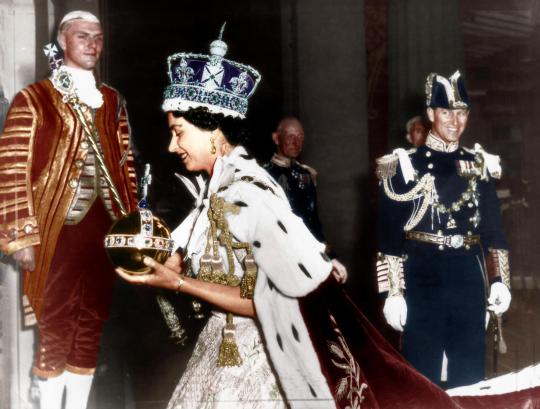
Elizabeth’s coronation marked a watershed moment for a monarchy that has, historically, been very hands off, old-fashioned and slightly invisible. Over the following years, the royals continued to embrace television as a way of connecting with the British people: In 1957, the queen delivered her annual Christmas address during a live broadcast. Again, this was Philip’s doing when he cajoled the Queen to televise her message live. He even helped her in how to use the teleprompter to get over her nerves and be herself on screen.
Four years later, in 1961, Philip became the first family member to sit for a television interview. It is hard for us to imagine now but back then it was huge. For many it was a significant step in modernising the monarchy.
Though not everything went to plan. Toward the end of the decade, the Windsors even invited cameras into their home. A 1969 BBC fly-on-the-wall documentary, instigated by Philip to show life behind the scenes, turned into an unmitigated disaster: “The Windsors” revealed the royals to be a fairly normal, if very rich, British upper-class family who liked barbecues, ice cream, watching television and bickering. The mystery of royalty took a hit below the waterline from their own torpedo, a self-inflicted wound from which they took a long time to recover. Shown once, the documentary was never aired again. But it had an irreversible effect, and not just by revealing the royals to be ordinary. By allowing the cameras in, Philip opened the lid to the prying eyes of the paparazzi who could legitimately argue that since the Royals themselves had sanctioned exposure, anything went. From then on, minor members of the House of Windsor were picked off by the press, like helpless tethered animals on a hunting safari.
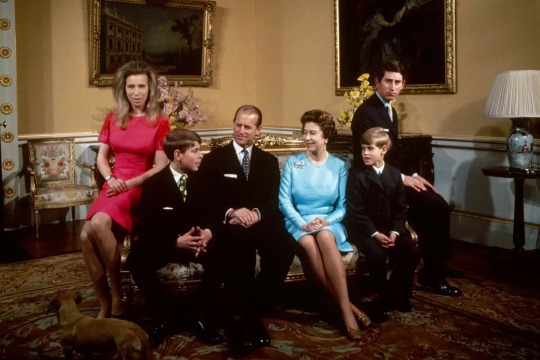
Prince Philip also took steps to reorganise and renovate the royal estates in Sandringham and Balmoral such as intercoms, modern dish washers, generally sought to make the royal household and the monarchy less stuffy, not to have so much formality everywhere.
Philip helped modernised the monarchy in other ways to acknowledge that the monarchy could be responsive to changes in society. It was Prince Philip - much to the chagrin of the haughty Princess Margaret and other stuffy old courtiers - who persuaded the Queen to host informal lunches and garden parties designed to engage a broader swath of the British public. Conversely, Prince Philip heartily encouraged the Queen (she was all for it apparently but was still finding her feet as a new monarch) to end the traditional practice of presenting debutantes from aristocratic backgrounds at court in 1952. For Philip and others it felt antiquated and out of touch with society. I know in speaking to my grandmother and others in her generation the decision was received with disbelief at how this foreign penniless upstart could come and stomp on the dreams of mothers left to clutch their pearls at the prospect there would be no shop window for their daughter to attract a suitable gentleman for marriage. One of my great aunts was over the moon happy that she never would have to go through what she saw as a very silly ceremony because she preferred her muddy wellies to high heels.
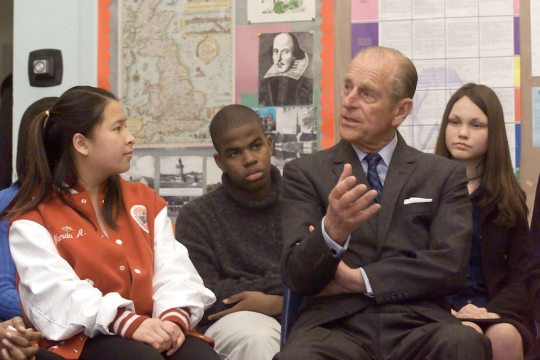
A former senior member of the royal household, who spent several years working as one of Prince Philip’s aides, and an old family friend, once told us around a family dinner table that the Duke of Edinburgh was undoubtedly given a sense of permanence by his marriage into the Royal Family that was missing from earlier years. But the royal aide would hastily add that Prince Philip, of course, would never see it that way.
Prince Philip’s attitude was to never brood on things or seek excuses. And he did indeed get on with the job in his own way - there should be no doubt that when it came to building and strengthening the Royal Family it was a partnership of equals with the Queen. Indeed contrary to Netflix’s hugely popular series ‘The Crown’ and its depiction of the royal marriage with Philip’s resentment at playing second fiddle, the prince recognised that his “first duty was to serve the Queen in the best way I could,” as he told ITV in 2011. Though this role was somewhat ill-suited to his dynamic, driven, and outspoken temperament, Philip performed it with utter devotion.
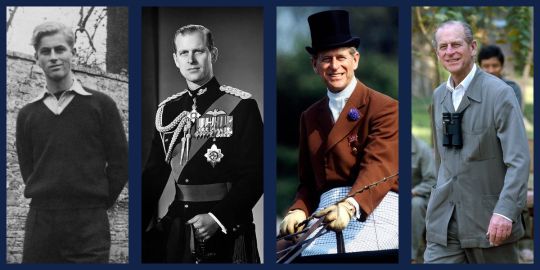
3. Prince Philip’s legacy
One could argue rightly that modernising the monarchy was his lasting legacy achievement. But he also tried to modernise a spent and exhausted Britain as it emerged from a ruinous war. When peace came, and with it eventual economic recovery, Philip would throw himself into the construction of a better Britain, urging the country to adopt scientific methods, embracing the ideas of industrial design, planning, education and training. A decade before Harold Wilson talked of the "white heat of the technological revolution", Philip was urging modernity on the nation in speeches and interviews. He was on top of his reading of the latest scientific breakthroughs and well read in break out innovations.
This interest in modernisation was only matched by his love for nature. As the country and the world became richer and consumed ever more, Philip warned of the impact on the environment, well before it was even vaguely fashionable. As president of the World Wildlife Fund (WWF) in the UK for more than 20 years from 1961, he was one of the first high-profile advocates of the cause of conservation and biological diversity at a time when it was considered the preserve of an eccentric few.
For a generation of school children in Britain and the Commonwealth though, his most lasting legacy and achievement will be the Duke of Edinburgh Awards (DofE). He set up the Duke of Edinburgh award, a scheme aimed at getting young people out into nature in search of adventure or be of service to their communities. It was a scheme that could match the legacy of Baden Powell’s scouts movement.
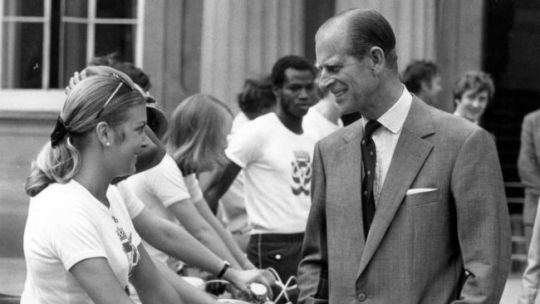
When Prince Philip first outlined his idea of a scheme to harness the values of his education at Gordonstoun by bringing character-building outdoor pursuits to the many rather than the fee-paying few, he received short shrift from the government of the day. The then minister of education, Sir David Eccles responded to the Duke’s proposal by saying: “I hear you’re trying to invent something like the Hitler Youth.” Undeterred he pushed on until it came to fruition.
I’m so glad that he did. I remember how proud I was for getting my DofE Awards while I was at boarding school. With the support of great mentors I managed to achieve my goals: collecting second-hand English books for a literacy programme for orphaned street children in Delhi, India with a close Indian school friend and her family; and completing a 350 mile hike following St. Olav’s Pilgrimmage Trail from Selånger, on the east coast of Sweden, and ending at Nidaros Cathedral in Trondheim, on the west coast of Norway.
It continues to be an enduring legacy. Since its launch in 1956, the Duke of Edinburgh awards have been bestowed upon some 2.5 million youngsters in Britain and some eight million worldwide. For a man who once referred to himself as a “Greek princeling of no consequence”, his pioneering tutelage of these two organisations (alongside some 778 other organisations of which he was either president or a patron) would be sufficient legacy for most.
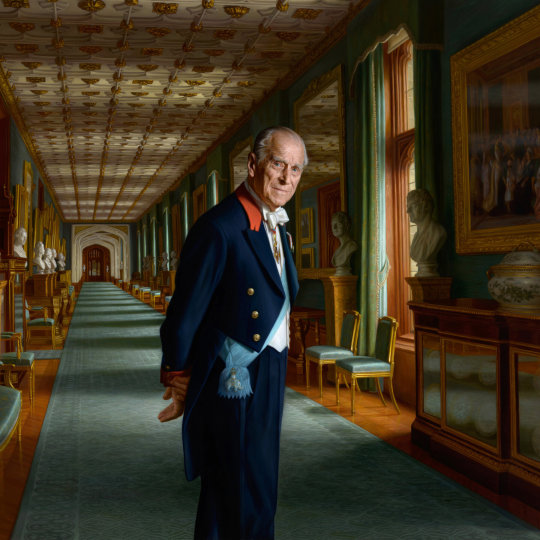
4. Prince Philip’s character
It may surprise some but what I liked most about Prince Philip was the very thing that helped him achieve so much and leave a lasting legacy: his character.
It is unhelpful to the caricature of Prince Philip as an unwavering but pugnacious consort whose chief talent was a dizzying facility in off-colour one-liners that he was widely read and probably the cleverest member of his family.
His private library at Windsor consists of 11,000 tomes, among them 200 volumes of poetry. He was a fan of Jung, TS Eliot, Shakespeare and the cookery writer Elizabeth David. As well as a lifelong fascination with science, technology and sport, he spoke fairly fluent French, painted and wrote a well received book on birds. It’s maddening to think how many underestimated his genuine intellect and how cultured he was behind the crusty exterior.
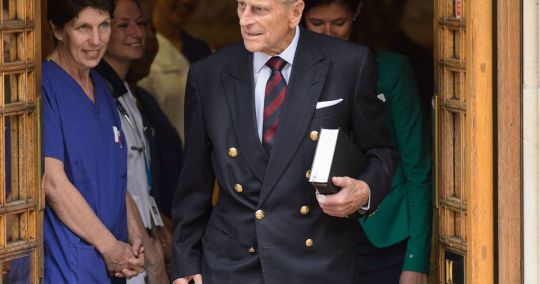
He didn’t have an entourage to fawn around him. He was the first to own a computer at Buckingham Palace. He answered his own phone and wrote and responded to his own correspondence. By force of character he fought the old guard courtiers at every turn to modernise the monarchy against their stubborn resistance.
Prince Philip was never given to self-analysis or reflection on the past. Various television interviewers tried without success to coerce him in to commenting on his legacy.But once when his guard was down he asked on the occasion of his 90th birthday what he was more proud of, he replied with characteristic bluntness: “I couldn’t care less. Who cares what I think about it, I mean it’s ridiculous.”
All of which neatly raises the profound aversion to fuss and the proclivity for tetchiness often expressed in withering put-downs that, for better or worse, will be the reflex memory for many of the Duke of Edinburgh. If character is a two edged sword so what of his gaffes?
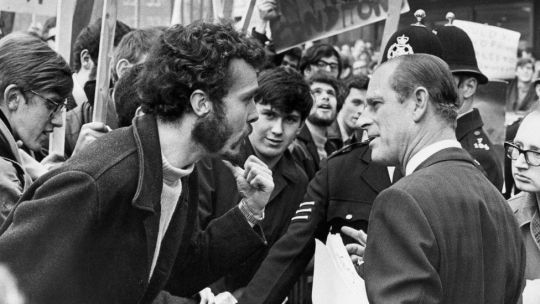
There is no doubt his cult status partly owed to his so-called legendary gaffes, of which there are enough to fill a book (indeed there is a book). But he was no racist. None of the Commonwealth people or foreign heads of state ever said this about him. Only leftist republicans with too much Twitter time on their hands screamed such a ridiculous accusation. They’re just overly sensitive snowflakes and being devoid of any humour they’re easily triggered.
There was the time that Philip accepted a gift from a local in Kenya, telling her she was a kind woman, and then adding: “You are a woman, aren’t you?” Or the occasion he remarked “You managed not to get eaten, then?” to a student trekking in Papua New Guinea. Then there was his World Wildlife Fund speech in 1986, when he said: “If it has got four legs and it is not a chair, if it has got two wings and it flies but is not an aeroplane, and if it swims and it is not a submarine, the Cantonese will eat it.” Well, he wasn’t wrong.
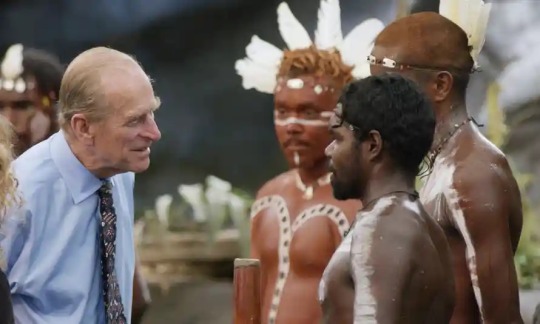
Philip quickly developed a reputation for what he once defined, to the General Dental Council, as “dentopedology – the science of opening your mouth and putting your foot in it”. Clearly he could laugh at himself as he often did as an ice breaker to put others at ease.
His remarking to the president of Nigeria, who was wearing national dress, “You look like you’re ready for bed”, or advising British students in China not to stay too long or they would end up with “slitty eyes”, is probably best written off as ill-judged humour. Telling a photographer to “just take the fucking picture” or declaring “this thing open, whatever it is”, were expressions of exasperation or weariness with which anyone might sympathise.
Above all, he was also capable of genuine if earthy wit, saying of his horse-loving daughter Princess Anne: “If it doesn’t fart or eat hay she isn’t interested.” Many people might have thought it but few dared say it. If Prince Philip’s famous gaffes provoked as much amusement as anger, it was precisely because they seem to give voice to the bewilderment and pent-up frustrations with which many people viewed the ever-changing modern world.
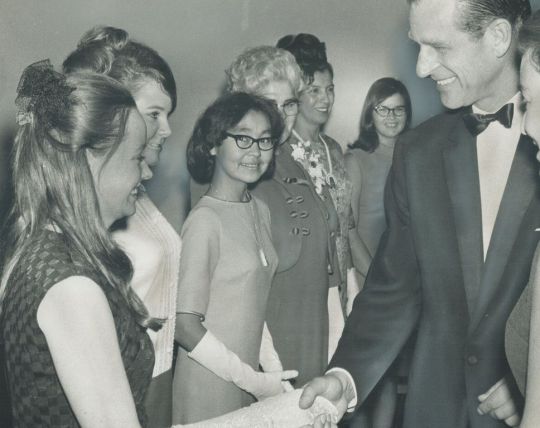
A former royal protection officer recounts how while on night duty guarding a visiting Queen and consort, he engaged in conversation with colleagues on a passing patrol. It was 2am and the officer had understood the royal couple to be staying elsewhere in the building until a window above his head was abruptly slammed open and an irate Prince Philip stuck his head out of the window to shout: “Would you fuck off!” Without another word, he then shut the window.
The Duke at least recognised from an early age that he was possessed of an abruptness that could all too easily cross the line from the refreshingly salty to crass effrontery.
One of his most perceptive biographers, Philip Eade, recounted how at the age of 21 the prince wrote a letter to a relation whose son had recently been killed in combat. He wrote: “I know you will never think much of me. I am rude and unmannerly and I say things out of turn which I realise afterwards must have hurt someone. Then I am filled with remorse and I try to put matters right.”
In the case of the royal protection officer, the Duke turned up in the room used by the police officers when off duty and said: “Terribly sorry about last night, wasn’t quite feeling myself.”
Aides have also ventured to explain away some of their employer’s more outlandish remarks - from asking Cayman islanders “You are descended from pirates aren’t you?” to enquiring of a female fashion writer if she was wearing mink knickers - as the price of his instinctive desire to prick the pomposity of his presence with a quip to put others at ease.
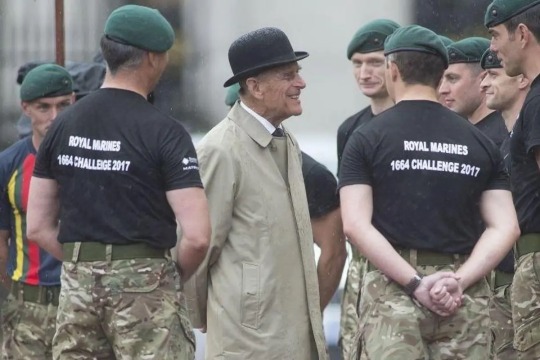
Indeed many people forget that his ‘gaffes’ were more typical of the clubbish humour of the British officer class – which of course would be less appreciated, sometimes even offensive, to other ears. It’s why he could relate so well to veterans who enjoyed his bonhomie company immensely.
But behind the irascibility, some have argued there also lay a darker nature, unpleasantly distilled in his flinty attitude to his eldest son. One anecdote tells of how, in the aftermath of the murder of the Duke’s uncle and surrogate father, Lord Mountbatten, Philip lectured his son, who was also extremely fond of his “honorary grandfather”, that he was not to succumb to self-pity. Charles left the room in tears and when his father was asked why he had spoken to his son with so little compassion, the Duke replied: “Because if there’s any crying to be done I want it to happen within this house, in front of his family, not in public. He must be toughened up, right now.”
But here I would say that Prince Philip’s intentions were almost always sincere and in no way cruel. He has always tried to protect his family - even from their own worst selves or from those outside the family ‘firm’ who may not have their best interest at heart.
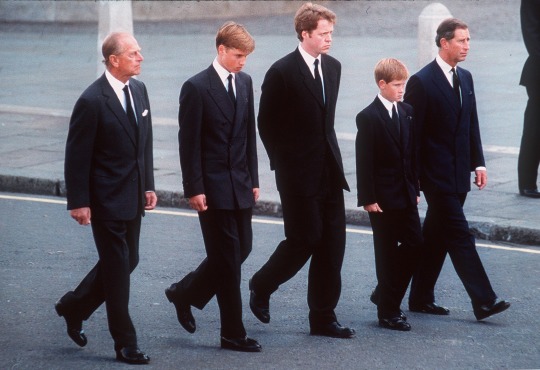
In 1937, a 16-year-old Prince Philip had walked behind his elder sister Cecile’s coffin after she was killed in a plane crash while heavily pregnant. The remains of newly-born infant found in the wreckage suggested the aircraft had perished as the pilot sought to make an emergency landing in fog as the mother entered childbirth. It was an excruciating taste of tragedy which would one day manifest itself in a very princely form of kindness that was deep down that defined Philip’s character.
When about 60 years later Prime Minister Tony Blair’s spin doctors in Downing Street tried to strong arm the Queen and the royal household over the the arrangements for the late Prince Diana’s funeral, it was Philip who stepped in front to protect his family. The Prime Minister and his media savvy spin doctors wanted the two young princes, William and Harry, to walk behind the coffin.
The infamous exchange was on the phone during a conference call between London and Balmoral, and the emotional Philip was reportedly backed by the Queen. The call was witnessed by Anji Hunter, who worked for Mr Blair. She said how surprised she was to hear Prince Philip’s emotion. ‘It’s about the boys,” he cried, “They’ve lost their mother”. Hunter thought to herself, “My God, there’s a bit of suffering going on up there”.’
Sky TV political commentator Adam Boulton (Anji Hunter’s husband) would write in his book Tony’s Ten Years: ‘The Queen relished the moment when Philip bellowed over the speakerphone from Balmoral, “Fuck off. We are talking about two boys who have just lost their mother”. Boulton goes on to say that Philip: ‘…was trying to remind everyone that human feelings were involved. No 10 were trying to help the Royals present things in the best way, but may have seemed insensitive.’
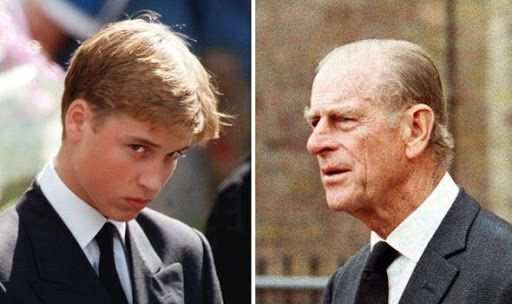
In the end the politicians almost didn’t get their way. Prince Philip stepped in to counsel his grandson, Prince William, after he had expressed a reluctance to follow his mother’s coffin after her death in Paris. Philip told the grieving child: “If you don’t walk, I think you’ll regret it later. If I walk, will you walk with me?”
It’s no wonder he was sought as a counsellor by other senior royals and especially close to his grandchildren, for whom he was a firm favourite. His relationship with Harry was said to have become strained, however, following the younger Prince’s decision to reject his royal inheritance for a life away from the public eye in America with his new American wife, Meghan Markle. For Prince Philip I am quite sure it went against all the elder Prince had lived his life by - self-sacrifice for the greater cause of royalty.
This is the key to Philip’s character and in understanding the man. The ingrained habits of a lifetime of duty and service in one form or another were never far away.
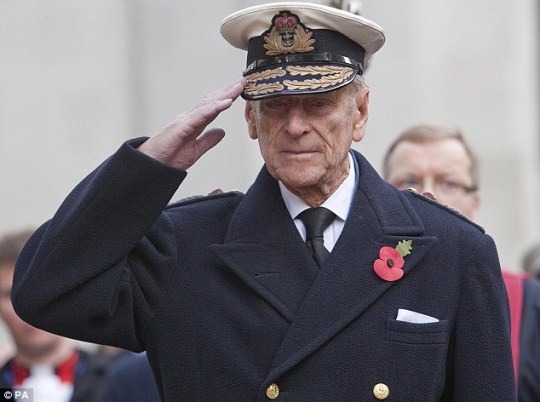
In conclusion then....
After more time passes I am sure historians will make a richer reassessment of Prince Philip’s life and legacy. Because Prince Philip was an extraordinary man who lived an extraordinary life; a life intimately connected with the sweeping changes of our turbulent 20th Century, a life of fascinating contrast and contradiction, of service and some degree of solitude. A complex, clever, eternally restless man that not even the suffocating protocols of royalty and tradition could bind him.
Although he fully accepted the limitations of public royal service, he did not see this as any reason for passive self-abnegation, but actively, if ironically, identified with his potentially undignified role. It is this bold and humorous embrace of fated restriction which many now find irksome: one is no longer supposed to mix public performance with private self-expression in quite this manner.
Yet such a mix is authentically Socratic: the proof that the doing of one’s duty can also be the way of self-fulfilment. The Duke’s sacrifice of career to romance and ceremonial office is all the more impressive for his not hiding some annoyance. The combination of his restless temperament and his deeply felt devotion to duty found fruitful expression; for instance, in the work of Saint George’s House Windsor - a centre and retreat that he created with Revd. Robin Woods - in exploring religious faith, philosophy, and contemporary issues.
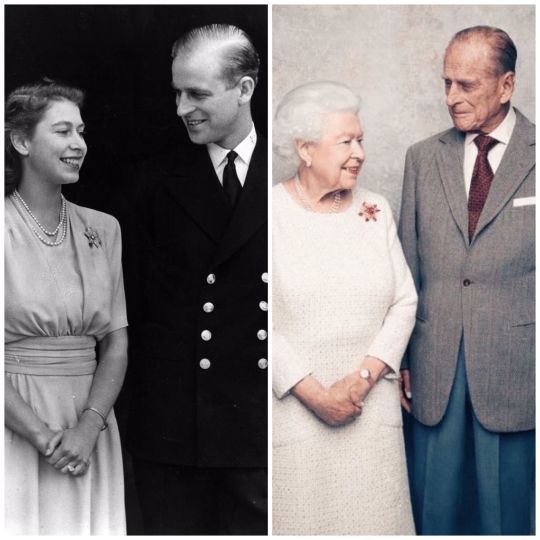
Above all he developed a way to be male that was both traditional and modern. He served one woman with chivalric devotion as his main task in life while fulfilling his public engagements in a bold and active spirit. He eventually embraced the opportunity to read and contemplate more. And yet, he remained loyal to the imperatives of his mentor Kurt Hahn in seeking to combine imagination with action and religious devotion with practical involvement.
Prince Philip took more pride in the roles he had accidentally inherited than in the personal gifts which he was never able fully to develop. He put companionship before self-realisation and acceptance of a sacred symbolic destiny before the mere influencing of events. In all these respects he implicitly rebuked our prevailing meritocracy which over-values officially accredited attainment, and our prevailing narcissism which valorises the assertion of discrete identities.
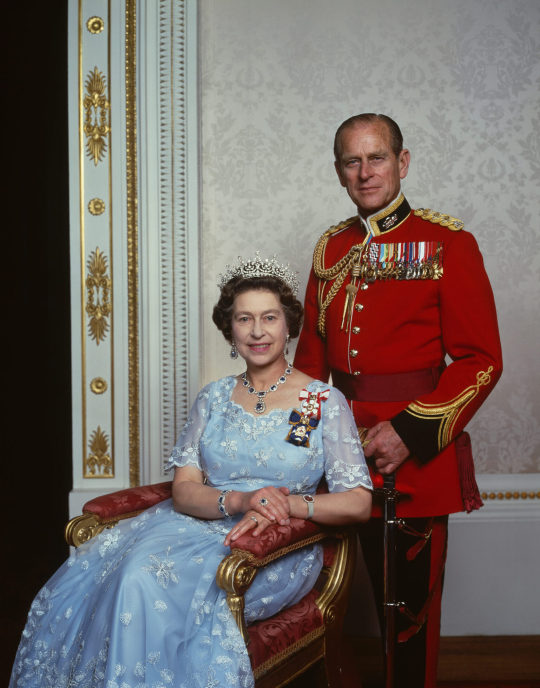
Prince Philip was Britain’s longest-serving consort. He was steadfast, duty driven, and a necessary adjunct to the continuity and stability of the Queen and the monarchy. Of all the institutions that have lost the faith of the British public in this period - the Church, Parliament, the media, the police - the Monarchy itself has surprisingly done better than most at surviving, curiously well-adapted to a period of societal change and moral anarchy. The House of Hanover and later Saxe-Coburg and Gotha (changed to Windsor), since their arrival in this country in 1714, have been noted above all for their ability to adapt. And just as they survived the Victorian age by transforming themselves into the bourgeoise, domestic ideal, so they have survived the new Elizabethan era (Harry-Meghan saga is just a passing blip like the Edward-Wallis Simpson saga of the 1930s).
There was once a time when the Royal’s German blood was a punchline for crude and xenophobic satirists. Now it is the royals who are deeply British while the country itself is increasingly cosmopolitan and globalised. British society has seen a greater demographic change than the preceding four or five thousand years combined, the second Elizabethan age has been characterised more than anything by a transformational movement of people. Prince Philip, the Greek-born, Danish-German persecuted and destitute wanderer who came to become one of the Greatest Britons of the past century, perhaps epitomised that era better than anyone else. And he got through it by making a joke of everything, and by being practical.
I hope I don’t exaggerate when I say that in our troubled times over identity, and our place and purpose in the world, we need to heed his selfless example more than ever.
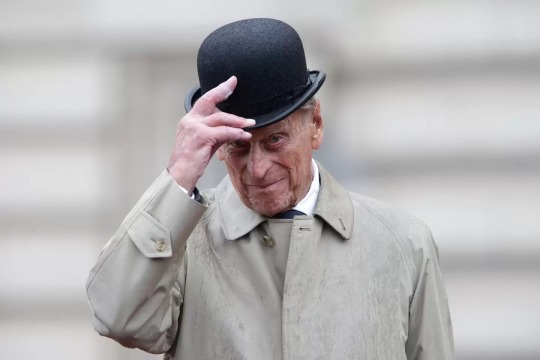
As Heraclitus wisely said, Ήθος ανθρώπω δαίμων (Character is destiny.)
RIP Prince Philip. You were my prince. God damn you, I miss you already.
Thanks for your question.
#question#ask#prince philip#duke of edinburgh#queen elizabeth II#the queen of spades#monarchy#britain#british#royalty#politics#history#culture#europe#crown#icon#great briton#society
284 notes
·
View notes
Text
The Monkey Island Games, Reviewed
We unexpectedly and delightfully got a new Monkey Island game last month, from series creator Ron Gilbert no less. And probably like a lot of other people, I took the opportunity to replay the series. I first played MI in the late 90s/early 00s (I actually remember the original, fully-pixelated versions of the first two games) and I've gone back to some of them from time to time. But this was my first time playing the whole series in order. These are my thoughts.
The Secret of Monkey Island (1990, remastered edition 2009) - the wellspring, the place where it all starts, and a game that lays the foundation for a lot of what’s at the core of this series. The story is pretty basic, and the puzzles are a bit on the thin side. But what’s important about this game, and makes it worth playing nonetheless, is how it establishes the essence of this series: the characters and their personalities and foibles, the historical setting that is nevertheless full of modern (well, late 20th century) touches. Most of all, this is a game that sets the tone for how this entire series will approach its puzzle writing - nothing sums up the Monkey Island games more than the fact that a crucial component for solving an early puzzle is a rubber chicken with a pulley in the middle. That humorous, improvisational approach will guide the best puzzles in this series for decades. (It’s also the game that invents insult swordfighting, which brilliantly squares the circle between the adventure game ethos and the more action-oriented setting.) There are better games in this series, but if you want a good sense of what its whole deal is, you’ll get it by starting at the beginning.
Monkey Island 2: LeChuck’s Revenge (1991, remastered edition 2010) - a game that wants to be The Empire Strikes Back while also referencing The Empire Strikes Back. It succeeds at the second one. On a surface level, LeChuck’s Revenge does a lot of the things we expect from a sequel that deepens and improves upon the original - the story is more complex, the tasks are more involved, and it reveals a backstory that threatens to develop into lore. But none of it feels particularly Monkey Island-ish. The irreverence of the setting is still there (Stan the used coffin salesman is a great touch), but the puzzles - which are also on the opaque and convoluted side - feel entirely generic, the sort of thing you could find in any adventure game of the period. That improvisational quality, the inherent silliness of the series and how it all ties back to Guybrush’s counterintuitive approach to being a swashbuckling hero, is absent. (Also, even by the standards of this series’s, shall we say politically incorrect, attitudes, the fat-phobic subplot is pretty hard to take.) The final act is a huge swing, and I’ve come to appreciate its weirdness - all the more so given that the cliffhanger ending has never been resolved. But when taken together with how atypical the rest of the game feels, it contributes to the impression that this whole installment was a creative dead end.
The Curse of Monkey Island (1997) - this is the first game in the series made without Ron Gilbert at the helm, so obviously I’m supposed to decry it as soulless extruded commercial product. But honestly, it’s very good? It’s a game that elaborates on the world and characters in exactly the way that LeChuck’s Revenge didn’t manage. This is the installment that cast Dominic Armato, Alexandra Boyd, and Earl Boen to voice the three main characters, and that’s perfect casting across the board. It’s also the game that introduces Murray, the demonic talking skull, one of the series’s best recurring characters. Most importantly, the storytelling and puzzle design feel like they reach back to the essence of the series - when one of the core puzzles involves improvising the materials for a voodoo hangover cure, and another requires you to impersonate a giant spectral chicken, you know you’re in good hands. It’s not without its flaws - that “try everything with everything” attitude that makes the second game such a slog is still present here, and the final act is a bit of a letdown (it tries to resolve the LeChuck’s Revenge cliffhanger without actually committing to a resolution, and ends up doing neither). But even with those problems, there’s an essential Monkey Island-ness that shines through and makes you feel like this series has a lot of life in it yet.
Escape from Monkey Island (2000) - and then the next game comes along and explodes that theory. Look, I’ll be honest here: I played this game fifteen years ago and hated it, but I didn’t remember much about why. So my plan was to replay it for this post, but I only made it half an hour before giving up. It’s just so badly conceived from top to bottom. The graphics are terrible - the mind boggles at having hit on the perfect visual approach with Curse’s cartoony style, and then switching to a fugly, cheap-looking 3D look. The controls are borderline unusable - why remove the point-and-click aspect from a point-and-click adventure game? And not only has Alexandra Boyd been replaced as Elaine, but the character is now speaking with an American accent for some ungodly reason. While I can’t critique the story or puzzles of Escape in much detail (I do remember a rather uninspired twist on insult swordfighting), I feel confident in saying this installment can be skipped.
Tales of Monkey Island (2009) - practically perfect in every way. I liked this game when I first played it, but I appreciate it even more every time I go back. This is a much broader canvas than the other games - the Telltale approach was to release their games in chapters, which means that each of the five installments here is a game in its own right, maybe half as long as any of the other games on their own. That gives the writers scope to create fantastic new characters, like the pirate hunter Morgan LeFlay, the mad scientist Marquis de Singe, the voodoo lady’s old flame Coronado de Cava, and his mutinous crew, setting them all in an involved story that creates the kind of lore that LeChuck’s Revenge was aiming at. It also allows them to go a little deeper with the established characters - the Guybrush of this game is a little insecure; its Elaine feels a bit torn between the need to be the responsible adult and her innate pirate nature; there’s a lovely frenemy-ship that develops between Guybrush and Morgan; and towards its end the game has real notes of darkness and tragedy. None of this would matter, of course, if the gameplay wasn’t up to snuff, but happily, Tales delivers Monkey Island puzzles at their fullest flower, whether it’s improvising the materials for a voodoo spell, helping a giant manatee court a mate with the help of a human-to-manatee tourist phrasebook, or corralling votes from the members of an anarchist collective by, for example, beating one of them at a face-pulling contest. I don’t recommend people start with Tales, because it helps to have a grounding in the series to fully appreciate it. But it absolutely could have stood as the end of the story.
Return to Monkey Island (2022) - but of course it doesn’t, because Gilbert has returned with this game. Which is… sweet. Not essential by any means, but a worthy return to the world and the characters for those of us who have missed them. There are some impressive technical improvements - the stylized graphics are fantastic and I think will age a lot better than most of the other games’ looks, and the point-and-click interface has been streamlined in a way that is a profound relief if you’ve recently spent the previous games laboriously trying to combine objects or hit on the right action. But in terms of the story and puzzles, the watchword here was clearly nostalgia rather than innovation. The puzzles are fairly simple, and instead of riffing or paying homage to canonical Monkey Island puzzles from older games, Return often seems to just copy them, usually in a very simplified form. In an afterword to the game, Gilbert writes that he was aiming at something more contemplative, befitting the fact that he’s returning in middle age to the game that made him famous as a young man. But again, this feels like something that the previous games in the series - especially Tales - had already managed more successfully. Return is worth playing if you’ve missed these characters and the vibe of the series, but there’s nothing here that really stands out.
7 notes
·
View notes
Text
into the woods
PAIRING: alpha!bucky barnes x innocent omega!reader
WARNINGS: age gap (reader in her 20′s, bucky in his mid to late 30′s), smut, a/b/o dynamics
A/N: this has some acotar vibes because i was reading it while writing this but i hope you enjoy it. have fun xx
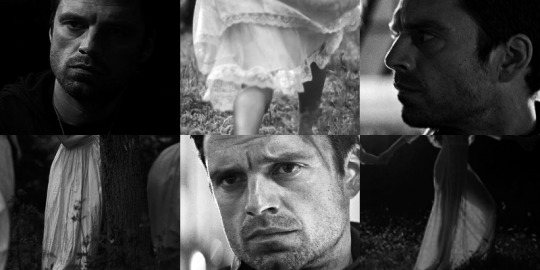
The High Lady of the North, is what they called her, or at least what they refered her. to whenever they spoke of her as seeing the daughter of one of the most powerful men in all the land was a rare sight. Those who knew her, knew her from her time at school and those who didn’t merely gossiped about her. They knew what she was, an omega, the first omega born in a family of alphas who had ruled over the land for centuries. Her birth had been celebrated as a gift to fertility yet, the most desired omega in all of the land was yet to participate in one of the Spring Celebrations where omegas going through their first heat would be chased by eager alphas into the woods. Y/N absolutely hated the mere idea of being thrown around like a piece of meat for alphas to go after and she was thankful that as years went by no sign of a heat was yet to come. Servants at the mansion would comment maybe she was an infertile omega while some commented she was merely buying her time. However, despite all those comments and all those titles thrown at her by people who did not know her, one person did know the reason why the omega High Lady was kept apart from everyone else. That person was James Barnes, Bucky for short. He, like everyone who surrounded her was an Alpha yet his task was merely to look after her whenever she wanted to venture around, not that she enjoyed to be out of her little walls for long.
He was quiet, a far cry from how loud every Alpha she knew was yet in his quietness and lonely demeanor, he had a power that kept everyone else at arms’ length. He wasn’t a brashy young Alpha who couldn’t control his nature, no, his inner wolf was always restrained with just enough of a facade that kekpt everyone else away. No one dared defy James Barnes unless they wanted to be beat to a pulp. That reputation had earned him a reputation which led to the job he had occupied for the past 3 years, starting during her 20th birthday. It hadn’t taken him too long to grow attached to her and her little quirks. Yet again, he was an alpha and she was an omega so he guessed biology played a role in it.
She herself wasn’t much of a outgoing omega, instead keeping to herself with her piles of books and flowers. However, recently, she was even more hidden from everybody, staying in her room covered by her blankets and vanilla candles and god blessed anyone who attempted to bother her. As the days went by, it became perfectly clear to everyone what was happening; the 23 year old omega was starting her heat.
- I don’t need to be coddled! - she snapped at Bucky as he stood by her side. He wasn’t closer than he usually was, actually, he was even trying to keep his distance. Despite his control, he knew how strong first heats were and he knew how easily they could trigger a rut even in the most experienced Alpha. However, he couldn’t help but find it amusing how irritableshe was.
- I’m sorry, m’lady. - he chuckled.
- You find it funny? - she crossed her arms, cocking her head to the side in a menancing manner; yet, she merely looked like an upset child in that ridiculous periwinkle dress. - I’m to be bait for horny alphas and you think it’s funny.
- You’re being overdramatic, you’re not going to be bait. Everybody does it.
- You didn’t do it.
- I’m not an Omega.
- You didn’t join the other alphas either. - she noted, continuing her distance from him. - It’s sexist!
- No one is going to touch you if you don’t allow it. You can’t force a mating bond onto someone, m’lady.
- Call me m’lady one more time. - she rolled her eyes.
- Sorry, Y/N. - he smiled and she couldn’t help but forgive him and he couldn’t help but not take it seriously. He knew she wasn’t sleeping, way too overwealmed by pre-heat and preparations for it. Just last night he’d seen her carrying more pillows into her bedroom along with a full supply of food. - You still remember how to mask your scent?
- Yes.
- Then they won’t even be able to detect you. They’re young alphas and will go for the omegas whose scent is stronger, you’ll most likely spend the night by yourself.
The two continued to walk past the meadows, her eyes never leaving the woods close to her childhood home where she was certain to be thrown into the next night. She wondered if Bucky was right and that would be enough. Maybe he was right about forcing mating bonds but she knew they could force something else ... she wasn’t naive.
- You’ll be okay. - he reassured, noticing how lost in thought she was. - I’d never let them harm you.
- You think I’ll smell bad? - she changed the topic.
- No. - he chuckled at her question. - Omegas always smell sweet. Haven’t meet an Omega who didn’t.
- Even the one you brought to your room last week? - he had unbelievable control but he was still an Alpha and a very desirable one. While he’d gotten used to having a few ruts every year, lately it appeared as every month he was going into ruts and after an Alpha goes into rut, well, they need to mate. He expected her not to have noticed, her room was very far removed from everyone else’s, standing in the highest floor, far removed from every Alpha and Beta in the house. Yet, he should’ve known how attentive she was, how observant, how no detail went unnoticed.
- I’m sorry if I caused you any trouble.
- You didn’t. - she didn’t look at him, continuing her walk around the gardens of the grounds she had grown up with. Roses of various colours were starting to bloom once again, creating a palette of soft hues which reminded her of soft spring paintings which hanged in the big halls of the old house. - They’re expecting me to find one, you know, a mate. They say they’re not but I know they are.
- Y/N ...
- You could go. - she argued, the same thing she’d been trying to convince him for the past days. - If you go, no other Alpha will try to even go after me.
- I’m too old for even participate in those things, besides you can take care off yourself.
She decided not to rattle him, childish crushes set aside, she knew he could be the one to keep every other young and power hungry Alpha away from her but Bucky was a hard one to convice. He was in his mid thirties and despite his good looks, he remained unmated, mostly hanging around with Omegas and Betas whenever his ruts were particularly bad. Staff would tell her he probably had no mate due to his actions in the war years ago, but Y/N didn’t really believe them. Nevertheles, he remained set in stone in the idea of not even attending the event, always saying “An Omega’s first heat close is way too dangerous”. She’d always retort if it was dangerous then he should be the one to protect her, yet he shrugged it off. So, she was once again back in her own and as the hours passed faster and faster, she found herself staring at her own reflection dressed in white. The same features as her mother’s stared back at her, yet she was no Alpha woman and her own biology reminded her. Her skin was starting to boil hot, a reminder of what was yet to come. She hoped it wasn’t as bad, she hoped she could bathe in the river coursing through the woods for the evening.
She emerged from her house, walking up hill just to beginning of the the woods. Several other new omegas were around, much younger than her, eager to take this new step and find their omega. Y/N, on the other hand, felt like this was merely another joke from the world yelling in her face that she was an omega. She, the daughter of an Alpha leader, the lady who’d inherit all the estate including the woods, the High Lady of the North, was an omega. There was only one reason why they were excited about a heat, it meant she could produce children, alpha children to continue the bloodline. She was merely a dark weak branch in the tapestry of her family. Her eyes scanned the Alphas who were about to participate, no Bucky in sight. She didn’t know why she had hope he’d come. Part of her understood it was dangerous, after all Bucky was fresh out a rut, his rut having started around the time her pre heat started so it was no good to have him around. Nevertheless, she wanted him here. Her hands clutched the lotion Bucky had given him as she ran into the woods with the other omegas, their white dresses disappearing into the dark green.
Bucky watched her from the crowd which had gathered to see the High Lady’s first attempt of a Spring cerimony. They clearly had nothing better to do, he thought to himself. How come her heat was that important? She was still a bright, intelligent woman who no question would well suceed her father as leader of the North court.
- You think she’ll come out mated? - one of the maids who’d come to see the spring cerimony asked.
- Don’t think she wants to. - he commented, mostly out of politeness. The last thing he wanted was a rookie Alpha laying a claim on his omega.
- I surely hope so. We were so blessed when her pre-heat started so sudden 5 nights ago.
- I thought it didn’t start up to 3 days ago.
- No, it was definetely 5 nights ago.
Shit.
Y/N continued to run through the woods, rubbing the lotion onto her scent glands in her wrists and junctures between the neck and shoulders. However, no matter how much her mind wanted to keep running, the heat was starting to overtake her and her legs were growing weaker and weaker until she tumbled onto the ground. Her head hit the ground, her eyes looking onto the stary sky as she heard the sounds of mating and footsteps. She just knew it was only a mere of time til someone found her and took her, but they only never be her alpha. No, it wasn’t the alpha she wanted.
She clenched onto the locket which was the only relief against her own skin, praying she could gain some strength to get up and continue to run. She didn’t want this, she didn’t want any of the alphas she’d seen. They weren’t her alpha. They’re not alpha, her mind yelled at her. They’re not Bucky.
The footsteps got louder and she reached for a sharp rock, preparing herself for whoever attempted to go after her. However, the person who emerged was someone who she had not expected. Standing away from her was Bucky, breath ragged and sweat covered forehead. Once his eyes set on her, his nostrils flared and he took a step back, faltering in his movements.
- Yo...you scared me. - she hiccuped, trying to move from the floor.
- Why aren’t you wearing the lotion, omega? - he’d never called her omega, he’d never dare to call his lady anything other than what she wished, yet Y/N couldn’t complain about being called omega by him.
- I am. - ever the argumentative, she showed him the empty tin of lotion yet Bucky could still smell her, and how fucking sweet did she smell. - Bucky, I don’t feel good.
- Shit ... - he shut his eyes. Control yourself, he told himself over and over again, but her scent was just intoxicating. It filled every single sense, every crock of his brain, telling him to take her, to take his omega, the same omega that was laying on the ground. The omega whose mere pre-heat had trigged his rut.
- Bucky ... - she clenched her stomach. It was bad, very bad. Her skin felt like it was burning and her inner thighs were starting to get wet due to the slick which just kept appearing. She didn’t kknow what to do, no one had told her what a heat felt like, no one had told her how to calm down. Looking at Bucky only made it worse, her mind yelling at her to be near him but his eyes were clear, don’t get close. - Alpha, please.
That name. Being called by his title by her of all people made him want to take her right there. No matter how hard he tried that’s all he could see in his head, making her feel better, knot her.
- It hurts. - she cried out. - I don’t know what to do.
She had heard from other maids who were omegas what to expect but she didn’t exactly know what to do. She was an omega in a family of Alphas; her father was an alpha, her mother was an alpha and so had their parents. She was the first omega to be born and it wasn’t her parents didn’t care about her they just didn’t know how to exactly raise an omega. It didn’t particularly help that she didn’t act like a stereotypical omega, or what an alpha family expected, so she was treated no different. Bucky also didn’t think her family talked much about mating; she was a high lady after all, the one who’d continue the family line. He wanted to help her, he really did but everytime he looked her, his inner wolf wanted nothing to but to lay his claim on her.
His mind was overwhelmed with thoughts of helping her clashing with doing what’s best for her. Bucky, an old alpha, definetely was not the best for her and he wasn’t fit to be the mate of the high lady, he wasn’t fit to be anyone’s alpha much less someone’s mate.
- I want it to stop. - she took him of his thoughts. In the absence of his attention, she’d managed to lean against a tree, her hands pulling at her dress, attempting to get some cold air.
- Not gonna stop for three days. - his voice was lower and she couldn’t help but feel entranced by him. She’d never seen him like this, acting like a pure alpha whose voice dripped dominance. His eyes shut again as her smell surrounded him once more. God, why did she smell so good?
- Make it stop. - she begged him. Him, out of all alphas, some sons of high lords themselves and here he was, the lower of the lowest born alphas. - Alpha.
- Don’t call me alpha. - he would lose it if she called him alpha even just one more time. He was barely keeping himself away from her, despite how much he wanted her. God, he wanted her. He’d always wanted her. The other alphas weren’t enough, no one would ever be enough for her.
His mind race with ways to help her. He could always try to lead her out the woods through the other side and sneak her back into her nest so she could go through her heat away from any eager alphas; yet, he doubted she could walk much at this moment and carrying her was not an option, not when she’d be so close to him, her skin touching his would end it for him. Yet again, he’d rather be damned than not help his Y/N. He couldn’t bare having her go through this when she didn’t want to. She deserved better than this, she deserved all the choices that were offered to her ancestors, no matter what biology dictated. Bucky would rather watch the world burn than to let her go through this a second longer.
With his mind set on taking her back to his bedroom, he told himself he could control himself. He was in his thirties, he’d had ruts before and he could conttrol himself. He took a deep breathe in before getting up and walking up to her. Her scent got stronger and stronger but his mind wanted her well, wanted her to be completely and fully happy. The alpha put his arms around her and picked her up, her legs dangling from the his arms. Intuitively, her nose rubbed against the scent gland on his neck. Her body slightly cooled down and she cuddled against him, happily surrounded by the scent of pinewood and ash dust. Despite her being much calmer, he himself could feel his blood boil. Her scent was starting to morph with his and all he could think about was her being absolutely owned by him. Yet, he had to keep those thoughts quiet. This was his lady after all and he owned her vasalage.
The night had dawned in and the once familiar woods were dark, filled with noises he knew too well and the sound of the creek passing by. He held her close to him, attempting to make his way through the darkness and out of the woods. A sudden noise had him stopping in his tracks. She looked up at him, with those eyes which just screamed trust within him, and a feeling of overwhelming possesiveness took control of him. He held her tight against his chest as his eyes zoomed onto the figure which made their way straight at them. He knew him. He was the son of a lord ruling over the south and Bucky absolutely hated him. He’d heard way too much about the young alpha to want him to stay away from his omega.
- Evening, m’lady. - he looked at Y/N, completely ignoring Bucky. She rolled her eyes, gripping Bucky’s shirt as much she could. - Bought Barnes with you?
- Move along, Michael. She’s not interested.
- I didn’t know you spoke for her now. - he took slow steps towards them, stalking them like a predator to a prey. - Unless you’re thinking about taking her just for yourself.
- Go away. - Y/N managed to speak through her heat, although even speaking made her uncomfortable.
- You stink, Barnes. - he snickered. - Yet again an omega in heat and an alpha in rut is never a good match is it?
- It’s none of your business.
- If you change your mind m’lady, just let me know. - he winked at Y/N before disappearing into the greenery.
Bucky’s eyes grew darker, his insticts taking more and more of his thought process. He wanted to hurt him for even daring looking into his omega’s way but her mewling had him back on his mission to take her back to her bedroom, back to her nest.
Y/N, however, had her eyes set on Bucky. Was he on his rut? He didn’t look like he was on a rut and she had grown up in an house of alphas. She knew what a rut looked like and she knew no omega wanted to be near an alpha in rut. But Bucky wasn’t acting domineering, he wasn’t angry, he wasn’t making advances, he was just stoic. Maybe she wasn’t enough of an omega for him, people always told her she wasn’t enough of an omega. She wasn’t enough for him. He probably looked at her like a silly rich omega and the mere thought of it made her heart ache.
- What’s wrong? - he stepped outside the dense greenery, seeing her house in the horizon.
- Is Michael right? Are you on your rut? - Bucky was pensive for a while. He didn’t want to scare her but he also didn’t want to lie to her. - I thought your rut was finished.
- Got triggered. - he replied. - I’m not gonna hurt you, I’d never hurt you.
- Does it hurt?
- Not my first rut, sweetheart.
- Is it because I’m not a good omega? - he snapped his head towards her harshly. No, his mind yelled out, you’re my omega how could you not be the only thing in this whole world which was good and bright. - Am I just not enough?
- What are you talking about, sweetheart? You’re being delirious.
- I know how alphas act around omegas, any omega. - he grip grew loose on his shirt as she looked down, unable to look at him. - Am I just ... not enough?
- Y/N ...
- You don’t need to sugar coat it for me. Nobody wants me. My parents didn’t want an omega, no one wants me to rule and not even the type of person biology dictated would want me wants me.
- You think I don’t want you? - his eyes grew dark, the baby blues replaced by dark blue all consuming. - You’re all I fucking think about ever since I met you. Ruts without you are a fucking nightmare because all I keep thinking is to find you and mate you. You’re my only omega.
- Then why won’t you mate me?
- I’m not good enough for you.
- You’re my alpha. It hurts whenever you bring another omega to your room because all I want to do is be your omega and now, now you’re pushing me away. You don’t want me just like everybody else.
- Don’t you dare say that. - ever. - Don’t you dare ever tell me I don’t want you.
- Then do something about it.
She was just being defiant now, a sparky little omega. One of the many qualities which he adored about her; yet again he loved everything about her. He knew she was his omega, she had triggered his rut way too easily and based on the timing of his last rut and her pre-heat it wasn’t stupid to assume he’d triggered hers. Nevertheless, he was not the right person for her. She already had a tough time trying to get people to take her seriously as high lady, if she sported his mark on her lovely neck, it’d only make it harder. He wasn’t a particularly good partner to have, much less for a high lady. Nevertheless, those words stroke a chord on him. How dare she think she was not enough? Looking back at her, he could see it clear as day, the heartbreak scetched onto her lovely features. His instincts finally got the upper hand over his better consciousness and suddenly his lips were on hers. Strawberry laced flavours had him growling for more, for her body yearning for him and then the innocent kiss started to descend as he tasted her skin.
His touch was soft and rough at the same time yet all she could think of was of him, having him. Her alpha. Her skin grew hot and cold in waves, his touch alone making slick run down her legs.
- You want this, omega? - he nipped at her scent gland in her neck. - You gotta tell me.
- Please, Alpha.
She leet out a small moan as he pushed her dress up, his fingers wandering close to her core as his lips kissed her skin leisurely. She wanted him, she wanted him so badly. His knee lodged between her legs, close to her pulsating core as he laid her down on the grass. She looked tempting, like a gift wrapped in white tafeta. How could he say no to her? How could he say no to his omega? He looked at her with lust filled eyes, head cocked to the side before leaning down to place a slow kiss on her lips, his hand massaging her breast, thumb teasingly rubbing her pebbled nipple.
His other hand replaced the pressure from his knee against her core, finger separating her folds as he started to circle her clit, his kiss silencing all her slow and earning moans. Her nails digged on his shoulders as she attempted to mutter a faster between his long kisses.
- Shush princess, alpha is going to make you feel all better. - his voice was low, almost mocking how yearning she was.
- I want you inside of me, please.
- You don’t need to beg, omega mine. I’m all yours.
His hand moved to hold her waist as he aligned his cock with her entrance. His eyes searched for hers, wanting to look at her before he did it yet as he looked into her eyes all he found was love and trust. Someone loved and trusted him. His omega loved and trust him and that was all he could ever want. He leaned in to kiss her again before fully slipping inside of her. He went slowly, watching the way her face contorted with pleasure just for him, listening to her little moans before he was fully sheathed inside of her. The two moaned in unison and he stilled, looking for any sign of discomfort in her face.
- Move, alpha. Move. - she begged, nails dragging up and down his shoulders.
- Whatever you want, sweetheart. - he leaned to kiss her again as he started to move in and out of her. She moaned out a breathy moan, hands holding onto him as he moved to kiss her neck, her scent making him drunk with pleasure.
She was filled with him and all that yearning only seemed to heighten everytime he moved. He was her alpha and she was happy being filled by him, being his. He nipped at her neck, continuing his movements so he could hear all those lovely moans. God, he was drunk on it, her scent and her moans. He moved his hand to feel himself against her stomach. God, she looked pretty, so owned. Those waves of heat were back again as she started to clench around his cock. His movements quickened as he let out a groan against her skin, his thrusts were no longer controlled and merely looking for release until she let out a high pitched moan.
- Fuck, omega. - he growled, before biting her skin as ropes and ropes of white painted her walls. His knot inflated, keeping them connected. He didn’t think he’d be able to ever leave her. - Fuck, Y/N, I’m sorry.
- You marked me. - she looked at him playfully, kissing down his jaw. - You’re stuck with me.
- I think it’s the other way around, m’lady.
- High Lord James Barnes, it has a ring to it.
- Don’t say that. - he hide in the space between her neck and shoulder, licking the fresh mark on her neck. - I should take you back to your nest, sweetheart.
- You’re joining me right?
- A heat is three days, omega. We’re going to have fun.
taglist: @kitty4860
#sebastian stan#sebastian stan x reader#sebastian stan/reader#sebastian stan x you#sebastian stan/you#sebastian stan x y/n#sebastian stan/y/n#bucky x you#bucky barnes#bucky#bucky/you#bucky x y/n#bucky/y/n#bucky x reader#bucky/reader#omega!reader#alpha!bucky#bucky smut
135 notes
·
View notes
Note
Hi. You made a post a couple of days ago about how queer historical fiction doesnt need to be defined only by homophobia. Can you expand on that a bit maybe? Because it seems interesting and important, but I'm a little confused as to whether that is responsible to the past and showing how things have changed over time. Anyway this probably isn't very clear, but I hope its not insulting. Have a good day :)
Hiya. I assume you're referring to this post, yes? I think the main parameters of my argument were set out pretty clearly there, but sure, I'm happy to expand on it. Because I'm a little curious as to why you think that writing a queer narrative (especially a queer fictional narrative) that doesn't make much reference to or even incorporate explicit homophobia is (implicitly) not being "responsible to the past." I've certainly made several posts on this topic before, but as ever, my thoughts and research materials change over time. So, okay.
(Note: I am a professional historian with a PhD, a book contract for an academic monograph on medieval/early modern queer history, and soon-to-be-several peer-reviewed publications on medieval queer history. In other words, I'm not just talking out of my ass here.)
As I noted in that post, first of all, the growing emphasis on "accuracy" in historical fiction and historically based media is... a mixed bag. Not least because it only seems to be applied in the Game of Thrones fashion, where the only "accurate" history is that which is misogynistic, bloody, filthy, rampantly intolerant of competing beliefs, and has no room for women, people of color, sexual minorities, or anyone else who has become subject to hot-button social discourse today. (I wrote a critical post awhile ago about the Netflix show Cursed, ripping into it for even trying to pretend that a show based on the Arthurian legends was "historically accurate" and for doing so in the most simplistic and reductive way possible.) This says far more about our own ideas of the past, rather than what it was actually like, but oh boy will you get pushback if you try to question that basic premise. As other people have noted, you can mix up the archaeological/social/linguistic/cultural/material stuff all you like, but the instant you challenge the ingrained social ideas about The Bad Medieval Era, cue the screaming.
I've been a longtime ASOIAF fan, but I do genuinely deplore the effect that it (and the show, which was by far the worst offender) has had on popular culture and widespread perceptions of medieval history. When it comes to queer history specifically, we actually do not know that much, either positive or negative, about how ordinary medieval people regarded these individuals, proto-communities, and practices. Where we do have evidence that isn't just clerical moralists fulminating against sodomy (and trying to extrapolate a society-wide attitude toward homosexuality from those sources is exactly like reading extreme right-wing anti-gay preachers today and basing your conclusions about queer life in 2021 only on those), it is genuinely mixed and contradictory. See this discussion post I likewise wrote a while ago. Queerness, queer behavior, queer-behaving individuals have always existed in history, and labeling them "queer" is only an analytical conceit that represents their strangeness to us here in the 21st century, when these categories of exclusion and difference have been stringently constructed and applied, in a way that is very far from what supposedly "always" existed in the past.
Basically, we need to get rid of the idea that there was only one empirical and factual past, and that historians are "rewriting" or "changing" or "misrepresenting" it when they produce narratives that challenge hegemonic perspectives. This is why producing good historical analysis is a skill that takes genuine training (and why it's so undervalued in a late-capitalist society that would prefer you did anything but reflect on the past). As I also said in the post to which you refer, "homophobia" as a structural conceit can't exist prior to its invention as an analytical term, if we're treating queerness as some kind of modern aberration that can't be reliably talked about until "homosexual" gained currency in the late 19th century. If there's no pre-19th century "homosexuality," then ipso facto, there can be no pre-19th-century "homophobia" either. Which one is it? Spoiler alert: there are still both things, because people are people, but just as the behavior itself is complicated in the premodern past, so too is the reaction to it, and it is certainly not automatic rejection at all times.
Hence when it comes to fiction, queer authors have no responsibility (and in my case, certainly no desire) to uncritically replicate (demonstrably false!) narratives insisting that we were always miserable, oppressed, ostracised, murdered, or simply forgotten about in the premodern world. Queer characters, especially historical queer characters, do not have to constantly function as a political mouthpiece for us to claim that things are so much better today (true in some cases, not at all in the others) and that modernity "automatically" evolved to a more "enlightened" stance (definitely not true). As we have seen with the recent resurgence of fascism, authoritarianism, nationalism, and xenophobia around the world, along with the desperate battle by the right wing to re-litigate abortion, gay rights, etc., social attitudes do not form in a vacuum and do not just automatically become more progressive. They move backward, forward, and side to side, depending on the needs of the societies that produce them, and periods of instability, violence, sickness, and poverty lead to more regressive and hardline attitudes, as people act out of fear and insularity. It is a bad human habit that we have not been able to break over thousands of years, but "[social] things in the past were Bad but now have become Good" just... isn't true.
After all, nobody feels the need to constantly add subtextual disclaimers or "don't worry, I personally don't support this attitude/action" implied authorial notes in modern romances, despite the cornucopia of social problems we have today, and despite the complicated attitude of the modern world toward LGBTQ people. If an author's only reason for including "period typical homophobia" (and as we've discussed, there's no such thing before the 19th century) is that they think it should be there, that is an attitude that needs to be challenged and examined more closely. We are not obliged to only produce works that represent a downtrodden past, even if the end message is triumphal. It's the same way we got so tired of rape scenes being used to make a female character "stronger." Just because those things existed (and do exist!), doesn't mean you have to submit every single character to those humiliations in some twisted name of accuracy.
Yes, as I have always said, prejudices have existed throughout history, sometimes violently so. But that is not the whole story, and writing things that center only on the imagined or perceived oppression is not, at this point, accurate OR helpful. Once again, I note that this is specifically talking about fiction. If real-life queer people are writing about their own experiences, which are oftentimes complex, that's not a question of "representation," it's a question of factual memoir and personal history. You can't attack someone for being "problematic" when they are writing about their own lived experience, which is something a younger generation of queer people doesn't really seem to get. They also often don't realise how drastically things have changed even in my own lifetime, per the tags on my reblog about Brokeback Mountain, and especially in media/TV.
However, if you are writing fiction about queer people, especially pre-20th century queer people, and you feel like you have to make them miserable just to be "responsible to the past," I would kindly suggest that is not actually true at all, and feeds into a dangerous narrative that suggests everything "back then" was bad and now it's fine. There are more stories to tell than just suffering, queer characters do not have to exist solely as a corollary for (inaccurate) political/social commentary on the premodern past, and they can and should be depicted as living their lives relatively how they wanted to, despite the expected difficulties and roadblocks. That is just as accurate, if sometimes not more so, than "they suffered, the end," and it's something that we all need to be more willing to embrace.
126 notes
·
View notes
Note
Are you still working on your Commonwealth study? Do you have any thoughts on Arthur's relationships with his colonies apart from Canzuk + US?
Not properly, unfortunately with exams and then work I haven’t had mental/emotional capacity to do real research (and probably won’t for a while 😔). But I have continued to think about and develop certain relationships, and I think I also have old hcs I’ve never shared, so I’ll put those down!
Born into the Empire
Australia
@oumaheroes has already done such great hcs on him idk what I can add, but basically he was a little bit of a rowdy child, always breaking windows and shattering fancy pots, never able to sit still. I think rainbow once mentioned that Ken (short for Kenneth, my name for Aus) was a lot like England as a child in his curiosity and energy, and I wholeheartedly agree. But I think Arthur’s intensity was more inwardly directed, pushing him to pursue and master new talents and learn whatever he could, while Australia is a little more carefree in his love for the outdoors, exploring, jumping around and off things, little wild animals. Unfortunately for him, he was born in a period of the empire when Arthur was very serious about his kids education, and therefore often praised those who studied hard and learned fast, which really just wasn’t Australia’s cup of tea. Australia took this kinda hard and thought he was the “dumb” one in the family that Arthur was always scolding, but in reality Arthur knew and appreciated that Australias interests lay elsewhere — he was just a frustrated, tired, parent who really wanted to give his kids the best while also holding his empire together, two goals that were never going to fit well in the end and would completely exhaust him.
As Australia’s grown older he’s realized a bit of this (not entirely, though) and also that 1) he really did break a lot expensive things and cause general mayhem 2) scolding us Arthur’s way of showing he cares, if he didn’t he wouldn’t have payed attention to him at all 3) despite being a penal colony, he was still one of Arthur’s more “legitimate” children (being white and a boy) and was therefore still incredibly privileged — never having to question, for example, why it was that Arthur was his dad, if it should be this way, or if he had a seat at the family table at all (more on this later).
New Zealand
Zee, from birth, was a clear favourite. Obedient, calm, quietly intelligent, he would also later develop a blistering sense of humour which combined with his appearance made it overwhelmingly clear who’s child he was. If Ken questioned his place in the family because of his poor academic record and others did because of their appearance/race/other complications, Kaelan never had such problems; his siblings called him the “prince.” Zee, however, also had a charm that, like Matthew, endeared him to his siblings and mostly protected him from jealousy, though he certainly still had issues with being called a try hard, daddy’s boy, bossy, arrogant. Certainly as a child Zee was a little prideful and, under that unperturbed demeanour, willful, but he grew out of it by the 20th century and became one of those most trusted by Arthur, second only to Matthew. He’s also always been inseparable from his brother Australia despite their differences, and today they both have one of the healthiest and most amicable relationships with Arthur of any nation, let alone former colonies (family road trips, every summer).
Bermuda
I absolute fell in love with this girl after reading about here, once, in this fic by @shachaai, and after that my mind just ran away with me. For me, her human name given to her by Arthur just has to be Ariel — for the little mermaid reference, yes, symbolizing her connection to the sea and stunning good looks, but also because:
1. Ariel is a biblical name, meaning lion of God. This makes sense to me, because Bermuda began as a Portuguese trade post, so Arthur definitely consulted our resident bad catholic Port before naming her.
2. Ariel used to be boys name. This also makes sense, because I hc Bermuda was and still is a tomboy. Bitch is fierce, takes no prisoners, and has zero filter. Her letters to Arthur, which all the colonies sent so Arthur could keep an eye on things, were full of shit like “I swear to god if the Spanish don’t get out of my waters I might eat one of them,” and “father, I asked you for destroyers two months ago, and yet you sent them to Hong Kong — could you explain this most unusual occurrence, surely it’s not that you forgot”, and “thank you for the harpoon on my birthday, I caught a small shark a couple days ago and have sent you some of its teeth for your collection.” Arthur tolerates this attitude because he’s weak when it comes to girls; he absolutely spoils his daughters (and flushes like a 16 year old when a woman so much as bats her eyelashes at him). Yes, p*ssywhipped Arthur is a hill I will die on.
3. It also suits her because? Ariel? Shakespeare? The Tempest? Bermuda Triangle? Shipwrecks? Daughter-like figure of powerful and vengeful sorcerer? Yeah. And this girl is a fire spirit — she is so lively, snarky, clever. As she’s grown older she’s mellowed out a little, but still: a no shit taken, no fucks given type of gal.
4. Speaking of growing up, she’s also become quite the beauty. Shacha, if I’m remembering correctly, described her as dark skinned, wavy-haired, and green eyed and that image has been burned onto the back of my eyelids ever since. Those Iberian genetics really be pulling through for her, that’s for sure. Engport love child if I’ve ever seen one. Definitely one of the prettiest in her family.
Singapore
I’ve already mentioned this to needcake, but I’m not too big a fan of canon Singapore, so this is my oc version. Singapore is fascinating to me because it had only a very small local population before it became a colony (The original settlement had actually been destroyed by the Portuguese about two centuries before the British started building a port there.) So nation-tans like Singapore and Bermuda really are Arthur’s children in the most direct sense of the word. And yet, Singapore is mostly ethnically Chinese, with Malays being the second largest group. Growing up Asian in a white, Victorian era family surely cannot have been easy and more than once Singapore probably wondered if there hadn’t been some mistake. To make up for the constant fear that he wasn’t “really” British, Singapore studied ferociously and had a truly terrifying work ethic. I’m not sure if this is common knowledge outside Asian circles, so I’ll mention that this hc comes from the fact Singapore is well known for having truly exceptional students and some of the most prestigious schools. Singaporeans score highly in literally everything and they have an advantage with good English learning environments, a highly desirable trait in Asia, but these results come from brutally long hours — and its really saying something that they’re known for working hard, considering the studying ethic of students in Korea, Japan, and China aint nothing to sneeze at, either. To me this actually fits really well with Singapore’s upbringing in Arthur’s household, because Arthur himself prizes intelligence and hard work above all else, being a workaholic himself.
As for their relationship, it was probably the best when Singapore was young and peaked in the 1930s with the massive naval base the British built at Singapore, at the time the largest dry dock in the world. Singapore was a well-behaved child, not necessarily introverted but not rowdy either, and all the way into his teenage years he truly admired Arthur and was proud to be a part of the British Empire, despite his lingering unease and insecurities. The British defeat in World War II, however, was a massive turning point. He had worked his ass off to be a good son, a good brother, to contribute to the only family and system he had ever known, and he had thought by the 30s he was finally on his way to becoming a fine adult. And suddenly, the British surrender brings his entire world crashing down. He had followed the rules faithfully thinking it was his destiny, but suddenly it was clear that all rules were made up. Of course, his insecurities exploded. If the empire was a ruse, what the hell was he? A part of the illusion? He couldn’t have a truly Asian identity, because many of the old East Asian nations shunned him for his Western upbringing, and he could not entirely understand their values either. So he was a kid who kinda had to figure out late and very very suddenly who the fuck he was and wanted to be.
And, well, he’s done pretty well for himself, hasn’t he. After having a total crisis and questioning everything, I think Singapore slowly started to realize that just because the British Empire as a political entity didn’t last forever, that didn’t mean that his entire childhood and identity weren’t real. The love he gave to his siblings and the love he got back, the hard work he put in, his bond with Arthur and the safe, happy childhood he had — those memories and feelings didnt have to be diminished by what came after. Essentially, he learned the lesson all nations have to learn, which is that one needs to be able to discern between duties as a nation and feelings as a human being, and to some extent keep them separate to protect both.
Whoooooo ok I’ll stop there because this turned into a dissertation, sorry. Let me know if there are any specifics u want me to elaborate on or anything I missed, but I’ll leave this here for today :)
#hws england#hws Australia#hws new zealand#oc: hws Bermuda#not gonna tag anymore I’m lazy#fun times with the commonwealth#I probably won’t write so much for all of them I just put it there to remind myself#needcake#ask#my hcs
43 notes
·
View notes
Text
S5 Ep 15 Pt 2: Don’t Trust Anyone Who Wears a Floor Length Robe Over Their Casuals in Yugioh
Hey, it’s my birthday, so I’m gonna release this early because the rest of today I just have to work like an adult and that’s no fun.
In the first half of this episode we dunked the worlds smallest plane into a lake and so this second half of the episode involved the kids running as far away from their only responsible adults as they could.
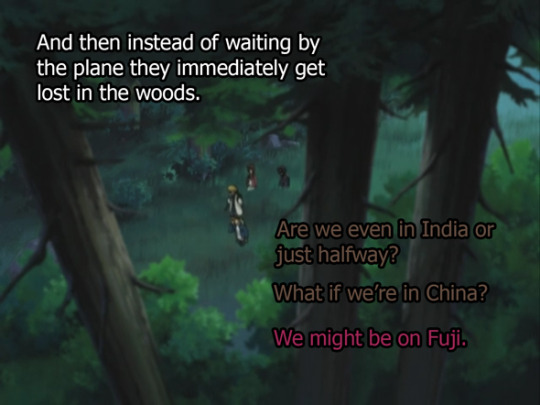
Which like...took whole of less than a second for them to peace out and enter mortal danger.
...I’ve never been in a jungle in India but...I have seen the Jungle book many times...and there’s like tigers and stuff in there, right? and tons of monkeys that are hella mean? And freakin snakes? They sing jazz and scat? That’s some terrifying stuff.
Like these city kids have to learn at some point to fear the woods. But they just freakin don’t. And strangely, the most dangerous thing in these woods isn’t even a snake or something, but a human man just being as suspicious as possible lying prone on the ground.
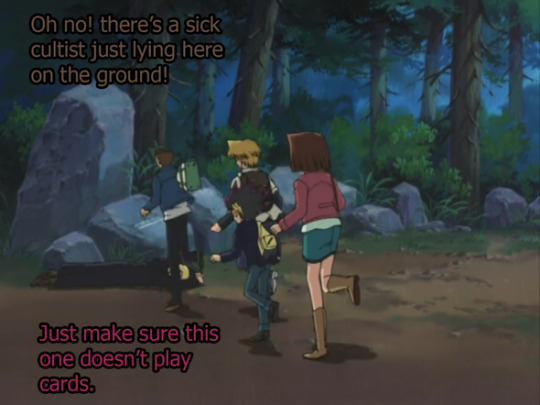

(read more under the cut)
The card cultist happens to have a British accent, because this voice acting team freakin loves to pull out their British accents. It’s not as lowbrow as Valon, but it’s not as...well whatever Bakura is supposed to be. He’s a lot more tame than Bakura’s, but still very British.
I don’t know if this is because British English tends to be taught instead of American sounding English in many parts of India, but, most likely they just wanted to do an accent. And like...he’s an archeologist...and so the stereotype is there...but honestly, the decision of making this guy British gets weirder and weirder as this episode goes on, get ready for it. None of you are ready for what I assume is the very obvious plot twist of this freakin guy.
Catfish of the century, this freakin guy, I’m pretty sure.

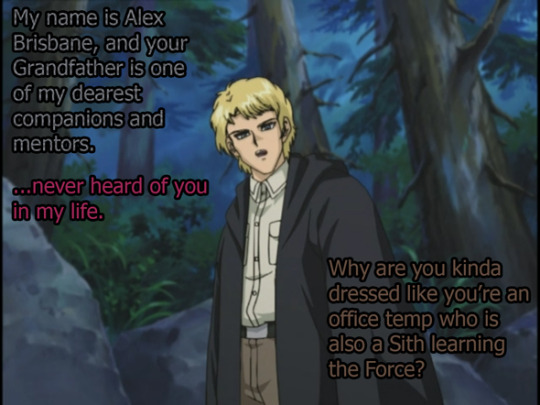
Yugi immediately believes this completely out of place white British stranger in the Indian backwoods next to this inaccessible lake and immediately thinks “yes, my Grandfather crash landed in India EXACTLY where I’m standing right now, and now I must save him.”
Thankfully, Yami exists to gently and politely tell Yugi to hella stop.

Also, I like that Yugi has finally stopped wearing his school outfit out of school. But, he is instead wearing a jacket that is so close to his school outfit I honestly couldn’t tell until the end of this episode. It’s like...I think one shade more purple, it has white piping, and his undershirt has a center seam. It’s nice Yugi has 3 versions of the same black sleeveless undershirt, and this show cares enough to show that tiny factoid about Yugi’s closet.
So, because Yugi is a dumbass and Pharaoh has to just sit back and watch this happen so he can say “told you so” later, they follow this random cultist they found in the woods. Much like Hansel and Gretel, we snack on cake crumbs all the way to the witches house, which in this case, is an undiscovered monolith you would have easily seen from outer space.

HMMMMMMMMMM.

And so get ready for this:

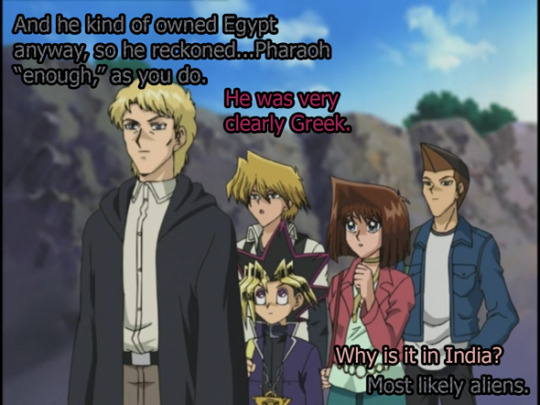
Hey guys.
Remember how Alexander the great was buried in a pyramid?
Now because they’re name dropping Alexander, that’s actually kind of helpful, because Alexander the Great’s favorite damn horse in the entire world died while he was at war with India so he named a city after it. It’s believed to be in Punjab, which is in the Northern part of India
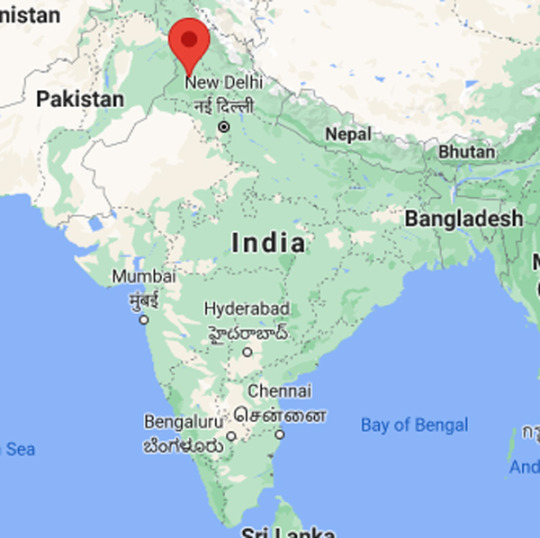
Which means we first of all, definitely crossed the tallest mountain range in the world to get here, and also means that we are like...in some really disputed territory of India right now, and it is crazy that these kids went here for a vacation completely unsupervised.
Another fun fact about Alexander is that when he died, it took 6 days for his body to decompose. At the time, they thought it was because he was a God (or in Yugioh’s case, Extremely Cursed) but nowadays historians think it’s because it took him 6 days to fully die. He just wasn’t dead yet. Had to give it a minute and the ancient Babylonians just got way too excited.
Anyway, Alexander super died in Babylon so I don’t know what the hell he’s doing in India. There is a fun spot in History where his body did get dragged to a couple different places, meaning we probably did lose the original Alexander and there’s a lot of people just guessing at where he ended up...but putting him clear up in India sure was a choice when one of his assumed burial sites was literally Egypt, which would be a more fitting location for a Pyramid and a more fitting location for this show.
Especially since Alexander was trying to invent a new race and culture...it seems a little strange he’d be buried in such a massive pyramid, but maybe he got a really, really good pyramid deal from the funeral home when he was like 28 and just figured he’d change it before the time he died at 32.
Which...now that I’m older than 32, how crazy is it that Alexander the Great died at freakin 32? You blink twice and you’re 32. Is history seriously trying to tell me this guy wasn’t like secretly 62? That maybe he just celebrated his 20th for like 20 years in a row as a royal mandate? I just feel like history is playing pranks on me with Alexander.
Anyway, our weird shady new archeologist guy is named Alex and so take that as you will.

I sure hope Alexander the Great was revived to wear khakis and bother children. Guy conquered the world once and was one of history’s Freakin Worst so he does deserve it, but also...it would explain why he thinks it’s normal to wear a Darth Maul robe over your business casual.
Anyway, lets enter the obvious trap pyramid.
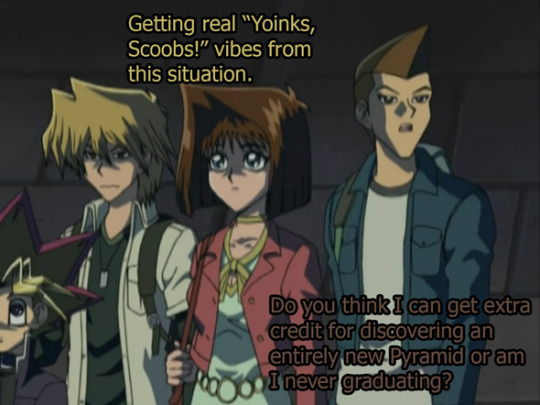
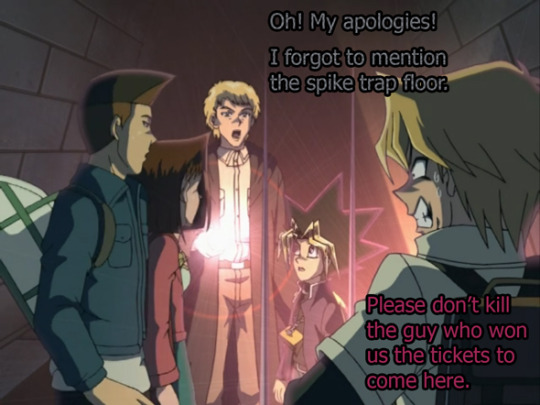
Joey just wanted a nice time running around Northern India. He just wanted to eat some yummy chaat and look at some tourist destinations and maybe glance at a Bollywood star or two. But instead he’s gotta deal with spike floors because Yugi couldn’t say no to a cultist.
Also...one of those spikes clearly went through Tea’s feet, right? And she is absolutely fine? Just checking on Tea’s godlike strength and clearly it is still godlike.
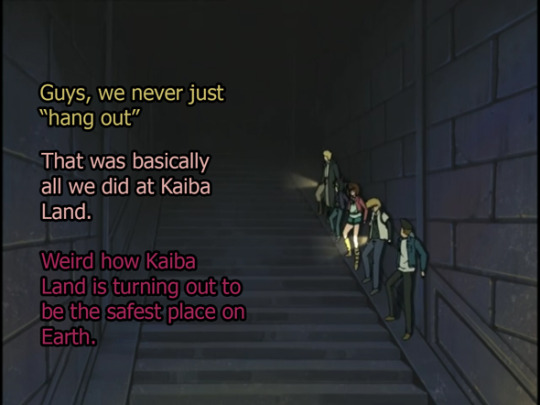

Alex gives us a very long explanation of how he went upstairs and Grandpa went downstairs, and there was a door or something so Alex turned back around and Grandpa was gone.
All of those steps were probably plot relevant and I’ll probably forget all about it in 2 episodes.

The thing is Alex...literally thinks he evaporated. Literally thinks that. But how do you disprove it to this freakin guy who like...might have named a city after his horse once and thinks that’s a normal and acceptable thing to do?

and so Joey immediately leaps onto the haunted playing floor.
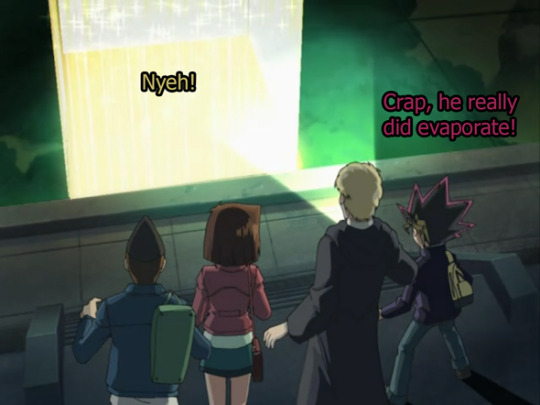
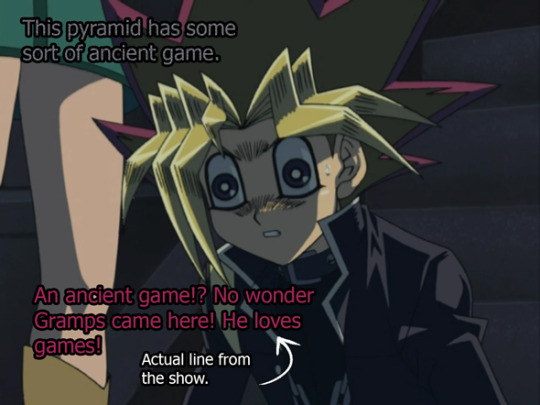
the way Yugi said this line was sort of hilarious to me so I may cap it. If I remember to do it (I’ve been a little busier lately, with things opening up, as you can tell because my update schedule is in the toilet.)
So, if Joey jumps in...everyone else has to, also.
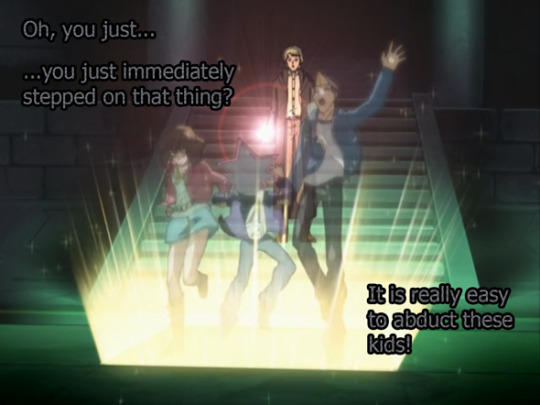
And we say good bye to Alex and enter the new forest zone, which looks a LOT like the other forest we were just in.
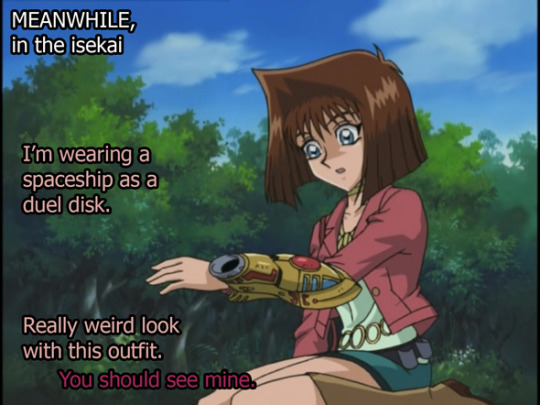
Nice Protoss armor.
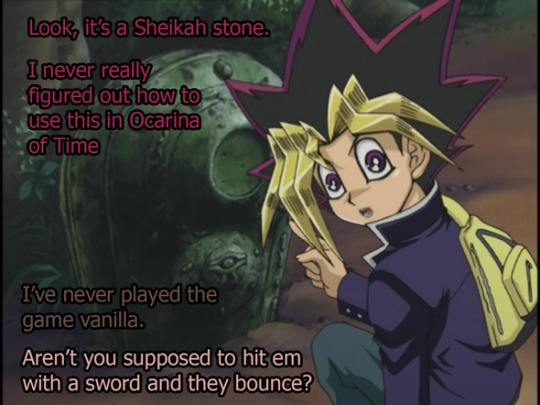
We get some hijinks from the local wildlife, which are all cards but real (but not real because we’re in a board game...don’t think about it) and the off brand Sheikah tablets have helpful monsters in them if you touch em.
This season may have been better off as a video game, being honest.

Joey has gone somewhere else, despite going onto the same game tile, and he’s too busy on a mountain range to really help anyone out. So he’s just gonna vibe up here for a bit.
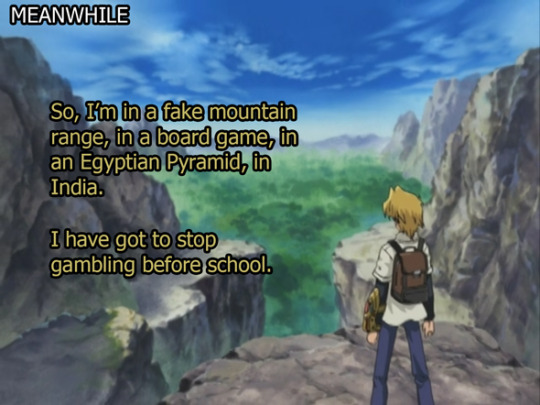
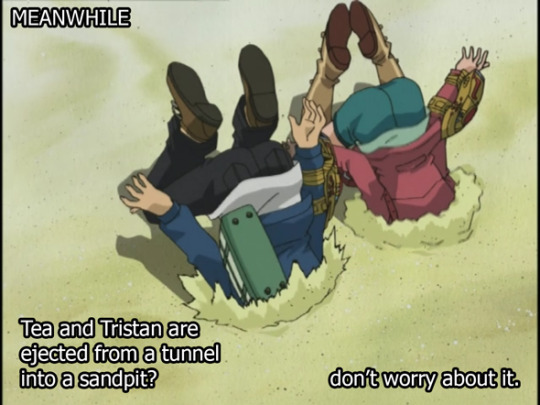
Tea got up after this point and said along the lines of “k, what’s next?” Because mortal danger does not affect her and she fears nothing.
At a beach somewhere, Tea and Tristan spend some quality time together forming a new family with whatever these creatures are.

And Tea’s love of her winged angel comes full circle and now I will suffer this winged orb for the rest of this arc, pretty sure.
Please admire the number of belts on Tea. Her outfit is like max 00′s and I appreciate that. We’ve had a lot of questionable fashion on Yugioh, but they actually dressed Tea pretty on point this arc. Like I often feel like 00′s fashion is hard to define or describe, but it’s Tea right now. That’s it. She did it, it’s right there.

Yugi gets a new flagship card for this arc, and this time it’s Celtic Guardian. Hell why? I feel like his defining card changes every single arc, and they need to like focus and just give him one. In fact, I’m pretty sure it’s still Dark Magician...and maybe the show forgot?
Anyway, if you just got here, this is a link to read the rest:
https://steve0discusses.tumblr.com/tagged/yugioh/chrono
I think I forgot that link in the last recap because yo it’s kind of been a while since I’ve updated, I feel. (well I had a graveyard post and those don’t count really) But, we’re back, we’re still going, slowly but surely.
#YGO#yugioh#Yu gi oh#episode recap#photo recap#S5#Ep16#yugi muto#yami#capsule monsters#tea gardner#tristan taylor#Joey Wheeler#Alex Brisbane#Alexander the freakin great#and a pyramid in the middle of Northern India#And lets just make it an isekai for kicks
35 notes
·
View notes
Text
Sorry. This might be annoying and excessively long. Among people interested in psychogeography, ecology, folklore, bioregionalism, urban geography (and Empire, hegemony, anti-imperialism, to a lesser extent, I guess?) there is a quote that gets circulated from time to time. I’ve seen the quote in academic articles, sure, but also on the W0rdpress blogs of, like, birders, hikers, gardeners, “bioregional animists,” and “woods aesthetic” fans. But why do both academic authors and popular/mainstream writers and bloggers and such consistently remove the end of this sentence from Michel de Certeau’s memorable statement: “There is no place that is not haunted by many different spirits hidden there in silence, spirits one can “invoke” or not. Haunted places are the only ones people can live in – and this inverts the schema of the panopticon.”
Gonna revel in the wonders of the garden, the forest, the landscape, the other-than-human lifeforms, and yet not willing to explicitly address the vulnerability, the cascading extinction, the tightening noose of imperial hegemony and carceral systems threatening it all, landscapes, lives, entire worlds? What de Certeau is referring to here is the way that imperial/dominant power structures (European modernity, Empire) try to subdue, erase, destroy smaller, alternate, and/or non-Western cosmologies, to make it seem like Empire is the only possible world that can be constructed. And so landscapes become sanitized, especially in cities, and de Certeau says that such sanitized places are “uninhabitable” because they are so cold, because Empire tries to standardize experience, rather than allowing localized connections tor regional landscape. But the alternative worldviews, the histories, have not been fully erased, and exist in the cracks and crevices of modernity, and so there are “ghosts” of alternative worlds which live on. And it is the remnants of other worlds, or the glimpses of other creatures (animals/plants/etc.) or other surviving worldviews (graffiti in the subway, which rejects order and control), or the hopes of possible better future worlds, crevices where the “failures” of modernity can be glimpsed, which make a place habitable. “Haunted geographies.”
Here’s a sentence fragment from a different author, writing about de Certeau:
“exotification and suppression, under a cloak of celebration”
This kinda thing.
This fragment comes from a criticism of early-20th-century Euro-American academia’s so-called “folklore studies” but I think it also describes much 21st-century academic interest in “ecological knowledge” and non-Western cultures. I have a feeling that this behavior is similar to what contemporary upper class careerist-academics in academic anthropology departments and those “studying the utility of traditional ecological knowledge” are doing when they superficially throw around words like “decolonial” or “Haraway’s Chthuluscene” in their article abstract for Cool Points without actually having given much through to the way they and their sponsoring institution, in their thirst for prestige or good optics or whatever, are in fact continuing to perpetuate dispossession and appropriation of Indigenous/non-Western knowledge. And on some level, it is deliberate and calculated, though not always a conscious act on the individual author/researcher’s part. Intentional power consolidation masked as passive chauvinism masked as benevolent paternalistic concern for “primitive peoples” masked as genuine respect. What’s happening is a recuperation, the subsuming of alternative cosmologies and ways of being. Hypothetical Nat/Geo article, variations of which you’ve probably seen before: “How can we utilize Indigenous knowledge? Can traditional knowledge help us battle climate change?” Empire, those in power, hegemonic institutions colonizing knowledge, thought, cosmology.
Plenty has been written, especially in recent years, of a “plurality/pluriverse of worlds in contrast to one imperial worldview/cosmology” and also the paternalistic attitudes of Euro-American anthropologists, but the mid-century work of Michel de Certeau, in my opinion, anticipated a lot of this disk horse. Here’s the fuller quote:
-----------------------
“In recent years, especially since 1960, scholarship in the service of popular culture has been of Marxist inspiration, or at least ‘populist’ in spirit,” de Certeau, Dominique Julia and Jacque Revel wrote in a 1980 essay, “but does the scientific operation it undertakes obey different laws than it did in the past? On the contrary, it seems to be dominated by the mechanisms of age-old excommunications…to conceal what it claims to show” (de Certeau 1986, 121). This opening statement encapsulates much of de Certeau’s thinking about the history of folklore studies. Tracing its development in successive stages from the late eighteenth century to the “heyday of folklore” in France’s Third Republic (1870-1940), the authors argue that the eighteenth century aristocratic vogue for “the popular” concealed a powerful movement toward the domination of the peasantry. This movement involved both exotification and suppression, under a cloak of celebration.“ The idealization of the “popular,” as they put it, “is made all the easier if it takes the form of a monologue. The people may not speak, but they can sing...The intent [of folklorists] is both to collect…and to reduce (de Certeau 1986, 122).[...] The governing ideologies driving the emergence of this obsession with the folk were not static, however, and therefore, in order to understand the development of the politics of culture in folklore studies, scholars must examine, at each point, its “subjacent postulates” (de Certeau 1986, 123). For instance, following the domination imbricated with the origins of folklore studies in the 18th century, by the mid-nineteenth century, the authors describe folklore as taking on a paternalist role vis-a-vis its subject. The collection of folklore by this time, embodied especially in the works of Charles Nisard (1808-1890), is not just a chronicle of its elimination by the elite, but a protective function executed by the elite on behalf of the incompetent peasant. In this view, de Certeau and his colleagues observe, “the people are children whose original purity it is befitting to preserve by guarding them against evil readings” (de Certeau 1986, 124, original emphasis). [...] This, then, is the basic outline of de Certeau’s historical critique of both the conceptualization of folklore and the discipline of folklore studies, as well as the core of his critique of cultural studies in the late 20th century. Interestingly, however, it is also the core of his larger understanding of the workings of modernity.
From: Anthony Bak Buccitelli. “Hybrid Tactics and Locative Legends: Re-reading de Certeau for the Future of Folkloristics.” Cultural Analysis, Volume 15.1. 2016.
--------------------------------
So there is a popular quote from Michel de Certeau (French interdisciplinary scholar, 1925-1986), which seems to have been yet more popular since, like:
(1) 2010-ish with elevation of Mark Fisher’s work; “object-oriented ontology”; “dark ecology”; apparent academic elevation of ontological turn in anthropology; and the white-washed Euro-American academic language of traditional ecological knowledge, “decolonization,” etc.,
And also since (2) 2014/2015 in “popular” media, with apparent mainstream-ing or “revival” of folk horror, alongside elevation of eco-horror, Anthropocene disk horse, etc.
(In my anecdotal experience, at least, reading about geography, folklore, psychogeography, etc. in online spaces from M.S.N chatroom days onwards.)
I’m of course very wary of de Certeau’s interest in and celebration of Freud (come on, bro) and also the implications of de Certeau’s Jesuit background and early interest in missionary stuff (gross). But de Certeau did write some thoughtful and nicely-phrased stuff (in my opinion) about the importance of subverting imperialist/hegemonic cosmologies; how Euro-American academic institutionalized knowledge reinforces power; imperative for combating hegemony/carceral thinking by connecting with landscape; the “memory” of places; the “hidden” histories of landscapes, etc. And he wrote this decades before academics started stealing from Indigenous people of Latin America and getting into pluriverse stuff.
Anyway, one quote in particular seems most popular. but almost every single instance where i’ve ever seen this quote shared, it always cuts out the last few words of the statement. The quote is from what might be his most widely-read work, the “Walking in the City” chapter of his 1984 book The Practice of Everyday Life. (it’s a pretty brief chapter which is available for free online; might take 30 minutes to read, if you’re interested.) The quote as translated by Steven Rendall: “There is no place that is not haunted by many different spirits hidden there in silence, spirits one can “invoke” or not. Haunted places are the only ones people can live in – and this inverts the schema of the panopticon.”
The “inversion of the panopticon” portion is almost always left out of the quote. even in academic writing or in the writing/blogs/whatever of people who otherwise seem like they would be down with anti-imperialism or something.
So, it comes across to me as if contemporary (2005-2020) academics and activists interested in, like, folklore or local horticulture or psychogeography will like ... take the “cute” fragments of these excerpts, but don’t want to “stir the pot” by presenting these writings in their fuller context, a fuller context which calls-out knowledge appropriation and explicitly trash-talks Empire.
And de Certeau’s not just writing about folklore or geography. He’s writing about taking action, about practicing alternative ways to relate to landscape in direct contrast to imperial cosmologies, academic/institutionalized/gatekept knowledge, and carceral thinking. (He’s famous for this; he emphasized “tactics” and “action.”)
So this guy is, of course, human, and had disagreeable and/or outright problematique associations. You can argue with his writing extensively. his publications are a mix of great, cool, iffy, “meh” and “bad take bruh.” But de Certeau was ahead of the curve in anticipating the way ambitious US academics would see “the decolonial turn” happening in academic anthropology in the 1990s/2000s and then weaponize it in a way that preserved their power dynamic and institutional power while still paying lip-service to “decolonization.”
But besides dunking on the imperialist foundations of Western institutionalized knowledge systems and the cunning employment of geographic re-worlding and re-naming in creating propaganda and imperial cosmology, and besides being ahead of the curve in anticipating re-enchantment trends and folk horror ... One thing I like about de Certeau’s writing is the emphasis on action, practice, and doing things to counter dominant/powerful cosmology’s attempt to destroy folk/non-Western worldview. Encouraging something like:
Take action. Books are cool, but books are not a substitute for action. Girl, you wanna study landscape, place-based identity, folklore, and how to escape the panopticon? Gotta put the theory texts down occasionally. Please go walk around in the forest; if you’re in the major city, don’t despair, just look at the moss growing in crevices betwixt the cobblestones. Imagine the ghosts, the histories, the stories, who died, what was lost, what’s come before. Power is trying to subsume all, but Empire gets anxious and flails because they know that there are gaps in their cosmology, cracks and breakages where other worlds seep through or can be glimpsed, retrieved, renewed. They know their cosmology can’t account for the diversity of life, the plurality of experience. There is not one world, but many. Find the crevices, the cracks, in the dominant power structures, and break them further. You can help to escape the tightening noose, the planetary-scale plantation, by using your imagination, cooking a meal, taking a walk.
298 notes
·
View notes
Text
The NHL, Boxing, & Ignoring The Right Thing To Do
Some days I wake up & pay attention to the news a bit, just to see what's happening.
The NHL Draft was last night, and I shouldn't have bothered with it, because I'm still angry at my Leafs for shitting the bed, again, in the playoffs (it's been 17 years since we last won a playoff round, and they've not won the Cup in my lifetime), but apparently the Montreal Canadiens, the most storied team in the sport, a team currently managed by Marc Bergevin, a guy who 10 years ago, when he ran player personnel for the Chicago Blackhawks, was somehow (it isn't clear) involved in hiring and/or protecting a video coach who sexually assaulted a bunch of teenaged players, the facts about which are only coming out now, and which look pretty damning for everyone involved, Marc Bergevin is now the General Manager of the Canadiens, and in the first round, they picked a guy who's been found guilty of sexual assault.
He apparently circulated pictures of a girl without her consent or knowledge while playing minor hockey in Sweden, and was found guilty under Sweden's assault laws. Now, he's expressed remorse, sure; he specifically asked the NHL to not draft him this year, so he could spend time and focus on improving himself and atoning for this in some way. And he's not some ultra hotshot phenom kid that people couldn't keep their hands off.
He's a guy, and even if you just think he made some kind of youthful mistake -- that would be a very bad take, which says a lot about you, not much of it good -- there's no need to reward him with getting picked, especially when he specifically asked not to.
But Bergevin, with the Blackhawks scandal hanging over him, chose this guy anyway. In the first round.
Not only that, the Canadiens had a statement about him pre-loaded & ready to go. Shareable graphic and everything.
https://twitter.com/CanadiensMTL/status/1418780212469411841
But no, instead, it's about this guy. Not even the girl he victimized. Him.
He tried to warn everyone off drafting him, which is to his credit, I guess. But Bergevin saw this kid, and decided, we need him in our organization. As is.
How good is he? Not that it matters in the slightest, but... he's a late 1st round defenseman. If he continues to develop, he'd basically make the show in 5 years or so. No one's projecting him to be an all-star or anything. There was no urgency; he was never going to make the cover of a Wheaties box or carry the flag at the Olympics. Even without the sexual assault conviction.
Marc Bergevin is a Hockey Guy, to the bitter end. But he's got a history -- and, apparently, a present -- of ignoring sexual abuse. There's no place in the sport, or in polite society, for that mindset. Certainly not now.
* * *
So, all this made me think about boxing.
For most of the 20th century, boxing was the biggest sport in the world. Fights filled arenas and stadiums around the world. The Heavyweight Champion was treated like a Head Of State; they'd dine with royalty, speak at major world events, their fights would be recorded and shown in theaters (and run for months), and then when television appeared, fights would be shown in prime time, and draw ratings better than any other sport.
In the early 1970s, Muhammad Ali was known, famously, as the most famous human being alive. (And Neil Armstrong and Chairman Mao were, like, right there.)
But boxing was deeply corrupt, and many of its stars were more than merely flawed, and every once in a while, someone would die in the ring, and so they stopped showing the fights in prime time, and the champions didn't really add much to the global conversation, and the promoters were ignoring a lot of bad things their star fighters were doing, because they were more focused on getting their cut of the gate receipts than they were in maintaining a product that kept new fans coming through the turnstiles.
And sometime in the mid-1980s, boxing's popularity started to wane. After Ali & George Foreman retired, there was a bit of a charisma vacuum at the top of the sport (I mean, Holmes & Holyfield seem like relatively decent guys, but the Crown Prince of Monaco isn't inviting them to a state dinner anytime soon); the welterweights & middleweights (Hagler, Hearns, Leonard, Duran) were compelling in the ring, but aside from Sugar Ray Leonard, none of them were particularly interested in being terribly showy.
And then Mike Tyson showed up at the end of the decade, and everyone was excited again, until he raped someone & went to prison for it, and got a face tattoo, and the slow decline of the sport became clear to everyone, and that was pretty much it for boxing as a major global sporting concern.
Sure, it still exists, but it's nowhere near what it was. If you want to watch boxing somewhere, you need to find a stream from somewhere on the other side of the world. Fans of hand-to-hand combat sports have gravitated to UFC & MMA, sports that 40 years ago literally no one outside of Brazil or Thailand had ever heard of; fans of the spectacle of fighting, the weigh-ins & pre-fight braggadocio, the As The Buckle Turns, well, they'll always have WWE & the other Steroid Soaps.
Boxing is irrelevant now. They took the biggest sport in the world, and through neglect and ignoring the serious problems at its core, they just... pissed it away.
I'm not usually the kind of person to bemoan moral depravity. (I actually like GG Allin's music. I think it's kinda funny.) But sports are entertainment that uses actual people instead of actors. Like entertainment, you want a compelling story, or at least some kind of ethos, or a thought-shape, that keeps people interested and wanting to come back. You can be heroic, or villainous, but you don't want people to see your product and think, eww, yeah, no.
With actors or songwriters (or pro wrestlers), you can build a storyline out, write a script, point the lights in a certain direction. Each game lasts this long, it builds to a crescendo in this way, when our team scores, we shoot off this cannon, when Mariano Rivera enters from the bullpen we play Metallica; the crowd expects those beats, and they're all part of the drama build. But the players are actual people, and there is no script, so you want to start with a cast that people will want to cheer for (or against) without feeling awful.
If you deny people that basic pleasure for long enough, they'll start looking elsewhere.
I've been a serious hockey fan my whole life. It's been my favorite sport since I was old enough to have an opinion. I've gone in & out on baseball, and over the years, the NFL has lost me to their CTE issues & their tone-deaf billionaire owners treating their players like chattel. But hockey, despite having some of those issues, and my Toronto Maple Leafs, as historically disappointing as they have been, have stuck with me. And I with them.
But the way the Blackhawks have dealt with these abuse allegations, and Montreal choosing this convicted assaulter with their first choice (and there've been a couple of other events; last year, Arizona chose a guy who repeatedly & publicly harassed a disabled person of color, and who has never apologized; they later rescinded their pick), I'm starting to wonder if hockey, a sport that doesn't have the mass momentum of boxing or football in their heydays, has already seen its zenith.
And that thought just makes me so very sad.
6 notes
·
View notes
Photo


—Francisco Pacifico, “The Sorcerer”
A useful contextualization of the late Italian publisher and author Roberto Calasso’s career, which I place here as a reminder to read more of his works. Over five years ago, I wrote about his Literature and the Gods here, and, without knowing the above, managed to catch the political drift: “Calasso is not an empiricist, not a sociologist, not a Christian, not a humanitarian, not a liberal, not a feminist,” I wrote, “he is a very late Late Romantic.” His resignation to the the day of red revolution is worthy of Huysmans or Houellebecq. Just “a Henry James” though, maestro? Considering the circumstances, wouldn’t it have to be The Princess Casamassima?
Anyway, when people—and I am certainly among them, Jesus knows (by “Jesus,” I mean James Jesus Angleton)—go on about how the CIA engineered anti-communism in the midcentury, they’re not wrong, but also all the agents were only pushing on an open door, as the above paragraphs disclose. Did the army of Enlightenment really expect writers and artists not to read Nietzsche, not to wonder about modernity’s obverse and underside and repressed, just to keep marching ever onwards and ever upwards into ever more light, to put literature wholly at the service of some spurious social mission to render humanity ever more scrutable before some scanning mechanism? Yes, the anti-communists had similar designs as the communists in the end; what we’ve come to call the “social credit score,” humanity seen as mobile aggregate of modular adjustable stimulus responses to be played upon by power, is modernity’s logical terminus left or right. But tactically, in the moment, one hurls the sabot to hand.
Incidentally, when the author off-handedly refers to Calasso’s literary celebrity in “the cosmopolitan eighties and nineties,” I was filled with nostalgia for a time I was too young to have caught anything but the very tail end of. Eco’s overrated essay on fascism denounces “syncretism,” yet the last quarter of the 20th century was, it seems to me, a literary golden age, at least compared to the autofiction and New Sincerity that followed, and it was so because it was syncretic, as the literary imagination in golden ages—Homer’s nomadic tribal urban palatial tragedy, Dante’s vernacular philosophical epic autobiography, Spenser’s Platonic Protestant Gothic romance, Goethe’s classical Walpurgisnacht tragedy, Joyce’s Celtic Greek Jewish epic—always is.
Syncretism aside, I’m not a European aristocrat—I don’t even have una portinaia, just two strong humble American locks on mia porta—so I don’t think of these matters quite the way Calasso did. Too dry, too abstract. My people left Europe; I am Anglo-American poetics’ heir by adoption: our royal road to the invisible runs through what is most visible, most palpable even, yet hardest to exhaust or explain.
5 notes
·
View notes
Text
Body Hair Positivity: Good or Gross?
It’s been a trend lately to embrace a more diverse image of beauty. Freckles and muffin tops, dark skin and curly hair, scars, tattoos, unusual proportions, crooked teeth, pretty much anything is supposed to be accepted under the banner of Body Positivity.
But what about body hair?
And I’m not just talking about armpits or legs. I also mean unusual body hair. The kind people don’t talk about. The kind women aren’t “supposed” to have: chest hair, happy trails, beards, back hair. The kind that doctors call hirsutism and is often associated with hormonal imbalances from things like Polycystic Ovary Syndrome, Cushing Syndrome, medication side effects, menopause, or even just genetics. It affects somewhere between 5%-10% of women depending on the region surveyed but may be higher as it can often go undiagnosed.
It’s not like we’re taught how healthy body hair should look.
Humans have been removing body hair since before recorded history. Archaeologists have found evidence of early humans using clam shells and shark teeth to remove body hair. Ancient Egyptians are well known for their full body waxes. Ancient Greeks considered it “uncivilized” for a woman to have pubic hair. Roman boys celebrated their entry into manhood with a mandatory first shave. And medieval European Ladies plucked daily to remove all hair from their brows, temples, and neck - some even plucked their eyelashes. The “New World” was no stranger to body hair removal either. Thomas Jefferson, and many others, wrote of some Native Americans’ depilatory obsession.
“With [Native Americans] it is disgraceful to be hairy on the body. They say it likens them to hogs. They therefore pluck the hair as fast as it appears.” - Thomas Jefferson, Notes on the State of Virginia
In the non-native US, body hair removal wasn’t really a big thing until the 20th century when we did a complete 180 on the subject. Before that Puritan values made sure that most body hair was covered by clothing so few bothered to remove it since no one was gonna see what was under all that cloth. Now recent studies say that 93 to 99 percent of American women regularly remove their body hair, making it one of our most widely practiced beauty norms. Girls as young as 10 are pressured into shaving, waxing, plucking, threading, anything to remove errant hairs as soon as they start to sprout. Refusal to do so leaves us open to bullying, both on the playground and in the office. Visible body hair can cost a woman jobs, promotions, and relationships so most of us remove it, no matter the cost. Which one study worked out to be more than $10,000 over the course of her life for the average American woman who shaves. If she waxes instead the bill goes over $23,000.
So what happened?
“Where eighteenth-century naturalists and explorers considered hair-free skin to be the strange obsession of indigenous peoples, Cold War-era commentators blithely described visible body hair on women as evidence of a filthy, ‘foreign’ lack of hygiene.” - Rebecca Herzig, Plucked, a History of Hair Removal
The driving forces behind hair removal in America are the same three that cause most of the nation’s problems: greed, sexism, and racism. Let’s go in chronological order.
As the “Age of Enlightenment” began to secularize European politics, Imperialists needed a new excuse to justify their expansion into non-European territory. Naturalists like the still famous Charles Darwin handed them pseudoscience. It’s debatable whether or not these naturalists intended their work to be used as the foundation for white supremacist ideology that still plagues us today but there’s no question about how racists interpreted it. They saw evolution as a line that went from ape through colored people and ends at Aryan. Real science tells us that’s not at all correct and if anyone is closer to cave man it’s white people who often have Neanderthal in their DNA. But they didn’t have genetic sequencers back then so they used physical traits to “prove” it instead. Part of this was a gross mischaracterization that body hair could be used to determine a person’s place within the line of human evolution. They claimed people with coarse, dark hair were closer to apes and those with thin, light hair were more evolved. Guess who picked up on that concept in the 20th century.
Darwin further complicated matters in his attempt to explain why some white people were hairier than some indigenous populations by associating hairiness with evolutionary backsliding and mental illness.
“[Hairiness in Europeans] is due to partial reversion; for characters which have been at some former period long inherited are always apt to return. We have seen that idiots are often very hairy, and they are apt to revert in other characters to a lower animal type.” - Charles Darwin, The Descent of Man
Other scientists and even medical experts of the time ran with this idea and before long the educated elite considered hairiness (along with other non-Aryan traits) to be a symptom of disease, insanity, and criminal violence. The uneducated masses were more familiar with freak show displays of unusually hairy people as “missing links” to our primate ancestors. Both cases considered having body hair to be a very bad thing. They’re also very bad science and not at all true.
Despite these very strong, racist feelings about body hair, it still wasn’t common for American women to remove it beyond the upper lip, neck, jaw, or between the eyebrows. Most women don’t have much hair there and those that did rarely had time or money to invest in removing it. Also they wouldn’t be caught dead admitting they had to so historical records might not be accurate about how many women actually plucked. For the first half of American history peach fuzz and other light hair was seen as normal and clothes covered the rest. But the 20th century not only saw women wearing less cloth and showing more skin it also saw them calling for gender equality. Critics of women’s liberation often accused suffragettes of sexual inversion - aka acting too much like men, which they saw as an abhorrent threat. To really drive this point home they often depicted women’s rights activists as being hairy, thus politicizing our pits. Pair this with the “hygiene” movement’s embrace of already mentioned racist views on body hair and you have a recipe for weaponized shame.
“Self-consciousness brings timidity, restrained action and awkwardness. The use of Del-a-tone relieves the mind from anxious watchfulness of movement.” - 1919 Del-a-tone depilatory advertisement
Enter Capitalism. Producers of hair removal products wanted to up sales so they did the exact same thing that was done with every other beauty product on the market - shame women into buying their stuff. It’s debatable if this was motivated purely by greed, in an attempt to reach an untapped market, or if the resulting gender oppression was intentional but men were spared of this aggressive shaming (until recently at least). Women, on the other hand, were flooded with advertisements for body hair removal products. From the first “razor for women” in 1915 to 21st century laser hair removal ads, women are constantly being reminded of our body hair. It doesn’t take a genius seeing ads that call smooth skin “attractive” or “sanitary” to extrapolate the opposite - that body hair is ugly, and dirty. A series of ads for Del-a-tone depilatory products even called it “necessary” for sleeveless fashion and suggests that not using their product will lead to social anxiety. Pair that with only ever using shaved models in all of fashion advertising and you send a pretty clear message: female body hair is something to be ashamed of. Advertising works. Now most American women actually feel gross if they’ve missed a shave, despite body hair being perfectly natural and not at all dirty. This disgust is so strong it has even bled over into an aversion toward male body hair which has seen a sharp decline in popularity since the shaggy chested disco days. Now men are being inundated with “manscaping” advertisements and expectations of manicured if not completely removed body hair.
So that’s the background but where’s this going?
While female body hair removal is firmly ingrained in western beauty standards, a new generation of women are rebelling against those ideals - body hair included. Recent studies have shown a shift in body hair trends among young women. Only 77% percent of women 16 to 24 reported regularly shaving their pits in 2016 and 85% shaved their legs, down from 95% and 92% respectively just two years prior. Since then we’ve started to see models, celebrities, and everyday women with unshaven pits and hairy legs. Body positivity campaigns have even gotten a few advertisers to include body hair in their ads. Now you can see razors actually shaving hair from women’s bodies instead of inexplicably running over baby smooth skin.
Women have always told ourselves that hair removal is a choice but we’ve never before been encouraged to choose not doing it. Instead we’ve been brainwashed to think it’s dirty and disgusting and that no one will accept us for being hairy. Today’s young woman is actually presented with a choice, “to shave or not to shave” and a lot of them are choosing not to. Which is great news for people like me who have hirsutism and are sick of being shamed for how nature made us.
But we’ve still got a very long way to go before I can be confident that my neck beard won’t hold me back both socially and professionally. A lot of the women who have publicly displayed body hair in recent years have come under attack by people calling them various shades of “gross” and some have even been sent death threats. It’s one thing for a rich and famous Hollywood movie star to take that kind of risk but for an autistic office worker living in a conservative backwater that’s a whole different game.
Whatever your thoughts and feelings on body hair, America still hasn’t escaped the shame of the last hundred years. Women are still very much judged for being hairy. A lot of people still think it’s gross. I’m not one of them but I’m full of unpopular opinions.
75 notes
·
View notes